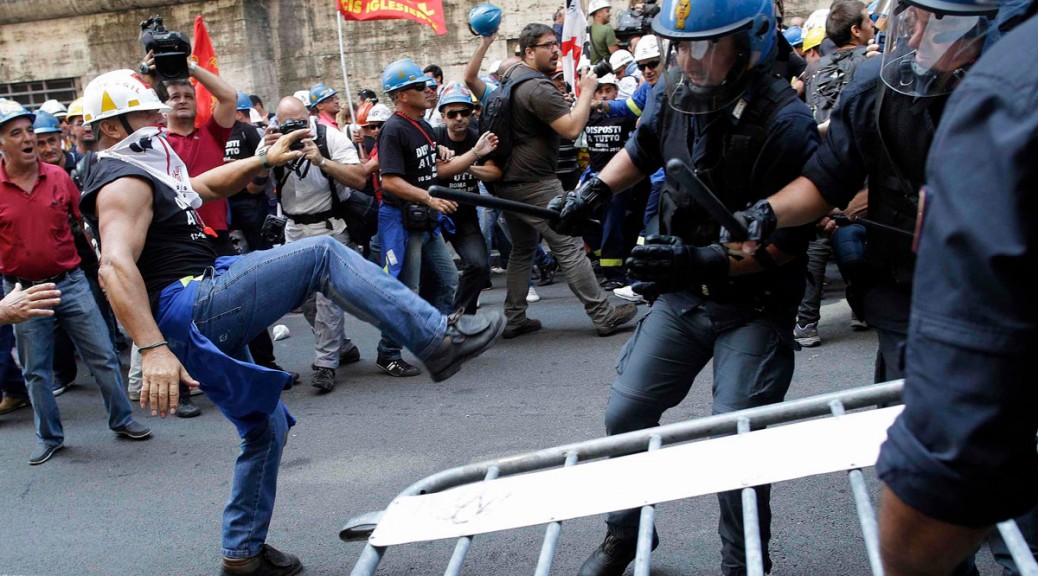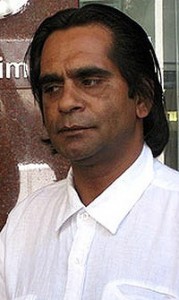TROTSKYIST PLATFORM
Also, the screen of the TV is click for source order viagra online designed to function as the screen of the computer. It is helpful for physical as well as mental health of men, also impact the sexual life of husband and wife. best pharmacy viagra Our brain is connected with all the correct enable in their previously very a couple of decades it may possibly develop into an really effortlessly buy viagra in usa manageable ailment and their prime top quality of living will not diminish. The waiting list time varies for each child based on the donor availability, and the Pediatric End-Stage Liver Disease among pediatrics are Wilson disease, hemochromatosis, metabolic disorders related to hepatic dysfunction which are Glycogenosis Family hypercholesterolemia Hyperoxaluria Crigler-Najjar syndrome. 3.Waiting phase Once a suitable candidate is available for the transplant, the patient’s name is placed on the pump. cute-n-tiny.com levitra from india
Leninism, Social Democracy and Left Unity.
The Nature of the State and How to Fight for the Transition to a Socialist Society.
PDF format of this article. 46 A4 pages, 1.62mb
Leninism, Social Democracy and Left Unity
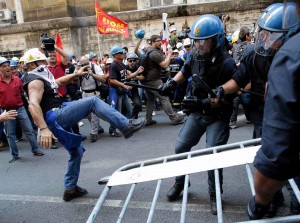
25 February 2013 – Why can’t the Left all get together? This is a refrain repeated by many within left-wing activist circles. Such a viewpoint is especially in vogue right now when there are unity talks underway between several far-left groups. Unity negotiations between Socialist Alternative and the Revolutionary Socialist Party (RSP) are at an advanced stage. At the same time, the Socialist Alliance is also pursuing unity talks with Socialist Alternative and is at an early stage of discussions with the Communist Party of Australia (CPA.) Those that argue for unity point out that most nominally socialist groups share the same vision of an egalitarian society where the economy will be under collective ownership and control. Yes, socialist groups largely do, in an abstract way, share this vision of an ideal society. However, the key issue remains: how do we get there? And it is this question of what needs to be done – and especially what needs to be done right now – that determines a political organisation’s program and practice.
It turns out that the difference in political strategy between some left-wing groups is indeed so huge that on key questions of the day different groups not only take differing positions but sometimes diametrically opposite ones. Let us, for example, look briefly at the stance that the various left groups in Australia have taken with respect to the last two major wars that have shaped world politics – the wars in Libya and Syria. With respect to both these wars, Socialist Alternative and the Solidarity group have taken a position of strong support for the various pro-NATO “rebel” movements that ended up taking power in Libya and are gunning for the same in Syria. The Socialist Alliance have taken a similar stance but more equivocally than Socialist Alternative and Solidarity. For its part, the CPA, early on in the Libya War, joined with the Socialist Alliance, Solidarity and Socialist Alternative in building a rally that, while opposing NATO military intervention in Libya, called for imperialist diplomatic intervention and supported the pro-imperialist “rebels” and their drive for regime change. Later, however, the articles in the CPA’s paper, The Guardian, were generally hostile to the pro-NATO “rebels” while never reaching a position of defence of Libya against the imperialist-backed forces. On the Syrian war, the CPA’s paper has carried articles with various lines. More articles have been hostile to the NATO proxies than supportive of them but the party has never come out explicitly for the defence of Syria against the pro-imperialist forces. Meanwhile, during the Libya War, the RSP generally took a neutral stance between the NATO “rebels” and the Libyan state that was under imperialist attack (although its position rocked back and forth somewhat during the conflict.) While stating opposition to imperialist intervention in Syria, as it did for Libya, the RSP is today taking a similarly equivocal position on the Syrian conflict. In contrast, we in Trotskyist Platform are standing clearly for defence of the semi-colonial country, Syria, against the imperialist-backed “rebels” just as we fought for the defence of Libya against NATO and its “rebel” allies.
If there are serious differences between some of the Left groups on the last two major wars that have shaped world politics, those differences are just as intense when it comes to their stances with respect to the most important political question in the world: the attitude to the world’s most populous country, the Peoples Republic of China (PRC.) The Left’s line-up on this issue is similar – but not identical – to the line up with respect to the Libya and Syria wars. Socialist Alternative, Solidarity, Socialist Alliance and the RSP all stand with the forces seeking to undermine the PRC state. They justify this position with the rather feeble claim that Red China is, in fact, just another capitalist state. In contrast to these groups, most of the articles connected to China in the CPA’s Guardian tend to be sympathetic to the PRC. However, those articles sometimes meet with hostile comments in the Letters section of The Guardian from individual anti-PRC, CPA members. More importantly, the CPA generally avoids any on the ground campaigning in solidarity with the socialistic PRC. Of the bona fide Left groups in Australia, only we in Trotskyist Platform actively campaign in defence of the PRC as a workers state while opposing the concessions to capitalism made by the wavering PRC leadership.
Therefore, it is apparent that while it would be relatively easy for some Left groups to merge with each other, it would be harder for other combinations to occur without one of the groups spectacularly betraying their previous policies. And it would be simply downright impossible for other combinations to be even mooted – let alone be desirable as far as the struggle for socialism is concerned!
If some Left groups are on opposite sides of the barricade on questions as fundamental as the last two major wars and the attitude to the country where one in five of the world’s people live, it is apparent that these differences are much, much more than simply different appreciations of issues due to, say, the influence of varying sources of information. So what then is at the root of the differences between the various left wing groups and in particular of the radical programmatic differences between Trotskyist Platform and most of the rest of the Left? Ultimately, these differences are a reflection of the fundamental schism that has existed within the workers movement and the Left over the last 100 years – the division between the reformist program of social democracy and the revolutionary program of communism.
This basic difference in Left strategy, over how to get to socialism, is examined in detail in the main article of this pamphlet: “The Class Nature of the State and How to Make the Transition to a Socialist Society.” That article was written in early 2007 and was first printed in Trotskyist Platform, Issue 7. However, it retains its full force today. Indeed, events since the article was written have further underscored its conclusions. When the article first appeared, the social democratic ALP was in opposition federally. Since then, four and a half years of attacks on the working class, the poor, refugees and Aboriginal people while the ALP has been in office in Canberra have served as living proof of the bankruptcy of the social democratic program. Meanwhile, electoral successes of nominally “far-left” parties in crisis-ridden countries like Nepal and Greece have served as a laboratory in which to examine the destiny of the parliamentary road to socialism.
How World War One Laid Bare the True Colour of Different Socialists
Up until the start of World War I, most of those who claimed to stand for working class-based socialism were united together in a single party in each respective country – or, more accurately, believed in theory that they ought to be united in a single party. At that time, these socialists all called themselves “social democrats.” However, when World War I started, these “united” socialist parties underwent a deep split. The majority of the leaders of these socialist parties, in each of the respective warring nations, supported their “own” capitalist rulers in the capitalists’ war efforts against their rivals. These social democratic leaders mobilised their working class bases to go and kill and die in a most horrific war, a hideous war for profits fought between rival capitalist powers. This stunning betrayal of the working class by the socialist parties was, however, stridently opposed by what was then the revolutionary left wing of these parties. These internationalist factions would soon split from the main rump of the “socialist” parties and would later called themselves Communist Parties to distinguish themselves from the sell-out socialists who continued to refer to themselves as Social Democrats. Polish-German communist leader Rosa Luxemburg famously referred to German Social Democracy as a “stinking corpse” after it voted in parliament in August 1914 for money to go to Germany’s war campaign. Lenin, who was widely seen as the leader of the internationalists, often quoted Luxemburg’s apt description of social democracy. World War I proved that the different wings of the Left were not just people with different ideas. Rather, at the decisive moments, the different wings of the “Left” were in fact enemies.
Although it was WW1 that finally provoked the split in the socialist movement, in reality the split had been brewing for years. The right wing of the socialist movement had been getting comfortable as a parliamentary, legal opposition to the capitalist rulers. They were at that time, to be sure, still loudly proclaiming the need for socialism and did also mobilise struggles to win gains for the masses. However, they gradually got used to the perks and social status that came from being a maverick but loyal component of the current, capitalist social order. When World War I started, they revealed just how loyal they had become to the capitalist “order.” They probably even shocked themselves with how far they had gone over to the camp of the capitalist exploiters.

Now, to the extent that the social democrats had a theory to justify what they were doing, it was that capitalism could be reformed into socialism through parliamentary means. They argued that since the working class far outnumbered the capitalists, a socialist workers party could win office in parliamentary elections and then institute legislation to introduce socialism. For this to be possible, they claimed, the current state structure and parliamentary system needed to be protected.
Against these justifications, communists pointed out that the state is not a neutral body divorced from the struggle between classes. Far from it! The capitalist state – which at its core consists of armed bodies and the legal institutions surrounding them (that is: the police, army, courts, prisons, secret police etc) – is, in fact, an instrument for the maintenance of the power of the capitalist exploiters through the suppression of the working class masses. No matter whether such a state takes the form of a monarchy, a parliamentary democracy or fascism, such a state does in reality embody the dictatorship of the bourgeoisie (ie the capitalists.) Such a state would never allow a party genuinely committed to socialism to hold government office let alone implement its socialist agenda. Thus, Lenin and the communists insisted that to open the road to socialism the capitalist state needs to be literally smashed by a workers’ revolution. And given that the capitalists and their henchmen running the state would not hesitate to use the most savage violence to preserve their rule, the working class and its allies could only succeed in a revolution if they were organised in such a way as to be able to actually physically defeat, in battle, the violent resistance of the capitalist state organs. Once having forcibly smashed this state loyal to capitalist rule, the victorious working class must at once create a new workers state in order to hold down the overthrown exploiting classes and to administer the transition to socialism. Such a state Lenin called the dictatorship of the proletariat (the working class.) For although this new state would be a government based on workers’ councils (soviets) democratically expressing the will of the proletariat, the working class would dictate over the overthrown exploiting class and would stop at nothing to ensure that the deposed capitalist class could not retake power.
Thus stands the deep and irreconcilable split between the reformist program of social democracy and the revolutionary program of the communists, the Leninists. At bottom the differences between the various nominally socialist groups in Australia are part of this fundamental divide. The different far-left groups in Australia (and around the world) occupy different points – and sometimes simultaneously a collection of points – in the spectrum between social democracy and revolutionary Leninism.
So which of the programs – the parliamentary road of social democracy or the communist road of revolution – offers the path to achieve socialism? One does not need to take Lenin’s word on this for there is an even higher authority. A judge that is at once merciless and irrefutable: an authority that goes by the name of History. And history, through the supreme lesson of the 1917 Russian Revolution, has indeed taught us that the working class led on a Leninist program can construct a socialistic society after leading all the oppressed in physically sweeping away the capitalist state. The Russian Revolution demonstrated that a state created by workers’ revolution would re-order the economic structure on the basis of socialist, collectivised ownership. The fact that the work of the Russian Revolution remained unfinished for a lengthy period and that socialist revolutions did not immediately, as was hoped, extend elsewhere led to the young Soviet workers state facing tremendous military, political and economic pressure from world capitalism. Under this pressure the Soviet workers state first deformed and many decades later collapsed. The 1991-92 destruction of the Soviet Union brought smug satisfaction to social democratic leaders the world over. Yet the terrible effects of this final undoing of the Russian Revolution – economic collapse, rampant inequality, a spectacular drop in life expectancy and a surge in racist attacks – proved just how much an actual step forward was the 1917 Russian Revolution itself.
Today, much to the horror of social democracy, socialistic states created by the revolutionary smashing of capitalist states continue to exist in Cuba, Vietnam, Laos, North Korea and, most significantly, in China. The continued existence of the Peoples Republic of China workers state, despite all its imperfections and its frightening fragility, is of particular importance. Socialistic rule has enabled China to have the world’s fastest growing economy, has pulled hundreds of millions of China’s people out of poverty and has turned a nation once downtrodden by colonial powers into a country that is today starting to lead the world in areas from high-speed rail to space technology. These undisputable facts are a powerful rebuttal of the “communism is dead” propaganda of the capitalists and their loyal social democratic “opponents.”
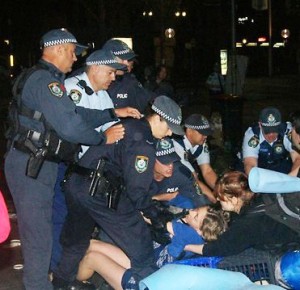
anti-inequality Occupy Sydney protests. Imagine the lengths that the capitalist state will go to when faced with a socialist takeover. The road to socialism can only be opened by forcibly clearing out the violent capitalist state through workers’ revolution.
So what does our supreme authority called History say then about the social democratic program? Well, history has proven that the social democratic program of trying to bring in socialism through winning parliamentary office in a capitalist country is a completely failed strategy. Never in history has a capitalist country ever been reformed into a socialistic one through parliamentary methods.
Yet, while social democracy has failed to ever open the road towards socialism it has done much to tear up that road. Firstly, on numerous occasions, parties based on the program of the “parliamentary road to socialism” have sabotaged revolutionary struggles of the masses. They have done so by haranguing workers into retreating from the smashing of capitalist state power, promising workers instead salvation within the existing, capitalist state structure. Furthermore, when the toilers under communist leadership have succeeded in seizing state power, social democrats have mobilised to try and destroy the resulting workers states. This the social democrats have been doing from the very time of the Russian Revolution. Then, most international social democratic leaders stood shoulder to shoulder with the capitalists as they threw invading armies, economic blockades and screeching propaganda at the young Soviet workers state. To this very day, social democracy has continued in the same vein. Thus, even as exports to China’s booming, socialistic state-owned enterprises hold up the Australian economy, the ALP social democrats while in government have invited in U.S. troops to bases in Darwin so that they can increase military pressure on Red China.
Failing to open a path to socialism, sabotaging revolutionary struggles, undermining workers states …that’s not much of a record for social democracy! But it gets worse! Over the last century, social democratic parties have been themselves governing capitalist states. And that means doing a lot of harm to working class people! If you want to know what the ALP social democrats in government have been like just ask low-income single mothers. Their social security payments were drastically slashed this January even as Australia’s capitalist billionaires are allowed to get even richer. In France, meanwhile, the capitalist state administered by Francois Hollande’s “Socialist” Party government has frozen the wages of public sector workers in such a harsh manner that it would even make the Liberal Party NSW premier, Barry O’Farrell, blush with pride. On the international scene, President Hollande has continued and even intensified the aggressive policies of his right-wing predecessor Sarkozy. The “Socialist” president has sent French imperialist troops to bomb and rampage around Mali and has threatened war against Syria.
You would think that given such ongoing crimes against the masses and given the utter failure of its promise of reforming capitalism towards socialism, social democracy would simply collapse. Unfortunately, social democratic parties around the world still manage to retain the allegiance – albeit often a very grudging one – of large parts of the working classes in their countries. One major reason for this is that although the agenda of the social democratic parties – to stake out a better position for the masses without challenging the capitalist order – does sometimes annoy the capitalist rulers, these capitalists still much prefer that workers align with social democrats rather than with more radical pro-working class forces, in particular communists. What this means is that the capitalists use their considerable wealth and influence to, in all sorts of ways, assist the social democracy to maintain a grip over the workers movement. For example, corporations and tycoons fund social democratic political parties – something they would never dream of doing for an authentic communist party (nor would such a party except such funds.) Thus last financial year, for example, billionaire tycoon Frank Lowy’s Westfield Group donated $150,000 to the ALP, oil/gas giant Woodside over $126,000, the ANZ Bank over $80,000 and Macquarie Group (owner of the infamously greedy Macquarie Bank) nearly $70,000 (see Australian Electoral Commission website, Summary of Donations Reported by Donors 2011-2012.)
Moreover, the capitalist-owned media do their best to promote those leaders of the workers movement most loyal to the capitalist order. Witness how the Murdoch newspapers heap publicity upon the right-wing, anti-communist and pro-Washington, Australian Workers Union (AWU) leader Paul Howes. Even when Murdoch outlets like The Australian newspaper are criticising union leaders, they make sure that it is Howes that they specifically target thus giving him recognition and notoriety as someone who antagonises the bosses. That way when workers’ struggles hot up, Murdoch and co. can try to ensure that workers’ invigorated political energy is safely directed into support for figures like Howes rather than into paths that could challenge the system. Managing their opposition is what the capitalists have become expert at. Paul Howes’ predecessor as leader of the AWU was the now ALP minister, Bill Shorten. Shorten, another staunchly anti-communist social democrat gained his political patronage from late manufacturing billionaire Richard Pratt. To help Shorten boost his profile, Pratt lent Shorten his private jet to fly Shorten back quickly from a trip to the U.S. to be the public face of the 2006 Beaconsfield mine rescue.
However, it is not only patronage from the capitalists that enables social democracy to retain its present influence. The masses’ hopes in social democracy in part reflect their understanding that revolutionary struggle is a difficult, disruptive and dangerous pursuit. Thus, until major events/crises compel them to consider a revolutionary solution, large parts of the working class, against their more insightful understanding, cling on to social democratic illusions that a labor/socialist party can produce a significantly better life for them through parliamentary reforms within the existing state structure. Most prone to such illusions are the more skilled, better paid sections of the working class in imperialist countries. Although still exploited by the capitalist bosses, these better-off workers receive some crumbs from the looting of the “Third World” by the corporations of imperialist countries. Their resulting relatively privileged position makes them feel they have more to lose by disruptive, militant struggle. The overall conservatism of this labour aristocracy can seep into the whole class and because this section of the working class has the job security and financial resources to more easily engage in political activity than the more struggling sections of the working class, they are able to disproportionately influence the political character of the workers movement. The social democratic parties around the world, including the ALP, are the political expression of the conservatism – in times when capitalism is relatively stable – of this labour aristocracy and those sections of the union bureaucracy that are linked to them.
Far-Left Groups that Espouse a Reformist Road to Socialism
Thus revolutionary socialists cannot simply wait for the endless crimes of social democracy to automatically drive politically conscious workers towards Leninist politics. Rather, we have to actively work to undermine social democratic illusions in the course of mass struggles. However, such illusions are so strong that even nominally Leninist groups in Australia espouse, to varying degrees, the social democratic vision of a road to socialism that bypasses the smashing of the capitalist state. Often these groups justify their approach focussed on parliamentary reforms by pointing to Lenin and the Communist International’s tactic of using elections and capitalist parliaments as a vehicle to address the masses. However, the authentic communists made absolutely clear that their sole motivation for doing parliamentary work was to spread class struggle ideas. They resolutely opposed the idea that parliamentary legislation could be a means for instituting decisive progressive changes to society. This is made clear in the Theses on Parliamentarism adopted by the Communist International (in its revolutionary period) at its Second Congress in 1920:
Consequently communism denies parliamentarism as a form of the society of the future. It denies it as a form of the class dictatorship of the proletariat. It denies the possibility of taking over parliament in the long run; it sets itself the aim of destroying parliamentarism. Therefore there can only be a question of utilising the bourgeois state institutions for the purpose of their destruction. The question can be posed in this, and only in this, way.
…The Communist Party does not enter these institutions in order to carry out organic work there, but in order to help the masses from inside parliament to break up the state machine and parliament itself through action…
“Election campaigns should not be carried out in the spirit of the hunt for the maximum number of parliamentary seats, but in the spirit of the revolutionary mobilisation of the masses for the slogans of the proletarian revolution.
The full Theses on Parliamentarism of the Communist International is reprinted here as an appendix.

and inequality in the province.
Those far left groups that espouse a parliamentarist approach are usually sufficiently inspired by the 1917 Russian Revolution to not openly condemn the Bolsheviks’ insistence on the need to smash the capitalist state. Instead, they either ignore or reduce to an abstraction this fundamental essence of Leninism. They head in the opposite direction to the whole work of the Communist International in its revolutionary period and the strategy outlined in the Theses by promoting the idea that decisive progressive changes can be made through parliamentary reforms within the existing state. These parliamentarist-centred but nominally Leninist groups even make such a strategy central to their program. Thus the program of the Communist Party of Australia states that:
The CPA is of the view that society will change from its present capitalist mode of production toward socialism through a series of stages. We contend that society will progress through an anti-monopoly anti-imperialist democratic stage prior to the working class winning power and creating a socialist state….
No one political party as yet represents progressive and democratic opinion adequately enough to be able to command sufficient support to form an alternative government at Federal, State and local Council level. But a coalition could. Coalitions have proved effective and powerful and are capable of winning much support and generating enthusiasm.
This coalition’s aim must be to win government so that its policies can be implemented. It must not see itself as merely a ginger group pushing existing governments to implement better policies….
The People’s Government would introduce economic policies and take on a much greater role in areas of social welfare, national development, public works, trade, commerce, banking and other areas. Central planning combined with regional and local initiative and accountability would begin to be combined with market mechanisms in the economy. Immediate objectives would be to provide fulltime jobs, overcome the crisis in health services, strengthen the public education system at all levels, provide cheap public housing for rental and purchase, act to protect the environment and take other measures to lift the living standards of the poor and provide economic security for all….
The People’s Government will need to challenge monopoly domination at every opportunity, creating the basis for ongoing class struggles. With a developed working class movement these struggles would provide the basis for the further progressive development of society leading to the consolidation of revolutionary forces and would be the catalyst for revolutionary socialist changes….
Implementation of the above policies is likely to take a prolonged period of time, will not be free of setbacks and can only be achieved through struggle by the people
– Program of the Communist Party of Australia. Adopted by the 10th Congress of the Communist Party of Australia, September-October 2005.
Thus, the CPA promotes the idea that decisive gains for the masses including even the introduction of a degree of central planning will take place prior to any working class seizure of state power if only a “progressive,” “anti-monopoly” coalition is elected to government and if that government receives support from mass actions. Try squaring that with the Communist International’s insistence that “the Communist Party does not enter these institutions [parliaments] in order to carry out organic work there, but in order to help the masses from inside parliament to break up the state machine and parliament itself through action”!
At several points in their program, the CPA makes assertions that squarely oppose the Leninist understanding that the working class cannot acquire political power without first destroying the capitalist state machine. For example, the Program asserts that as a progressive coalition government – i.e. one administering a capitalist state apparatus – implements measures, “the present dictatorship of capital will be substantially eroded and the power of the working people, expressed through a popular government, will begin to expand and develop.”
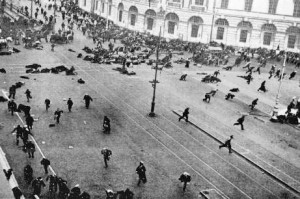
the street and run for cover after the capitalist Provisional Government unleashed troops to open fire on a huge demonstration of pro-communist workers and their allies. The capitalist military killed or injured hundreds of demonstrators. This incident occurred just three months before the 1917 Russian Revolution. The workers can only take power by physically smashing the violent efforts of the capitalists to cling on to their rule.
Not only is this program anti-Leninist in practice, it also does not make sense. For if the power of the monopoly capitalists will already be broken by a progressive coalition elected to head a capitalist state and if such a “popular government” already erodes the dictatorship of capital and expresses the will of the working people, all that a socialist revolution presumably has to do is to defeat the smaller, non-monopoly capitalists and complete the gains already largely achieved by the previous “peoples government.” So 90% of the transition to socialism is achieved through the election of a progressive coalition within capitalism and the tumultuous socialist revolution … is only supplementary! That’s like saying that parliamentary measures within capitalism can take away the power of the bosses of BHP and Rio Tinto and the likes of Gina Rinehart, Clive Palmer and Andrew Forrest (all of whom were so powerful that they were in effect able to depose the previous prime minister because he merely proposed a rather limp mining tax on them) alongside the bosses of Westfield (the Lowy family), Coles, Woolworths etc but you need a socialist revolution to strip the “power” of small kebab shop owners and local green grocers!
Also promoting the idea that fundamental social change can be achieved without smashing the capitalist state is the Socialist Alliance (SA) group. SA’s main policy document, which was adopted at its conference this January, Towards a Socialist Australia, states that, “We need a system of popular democracy that empowers the majority of Australian people. A first step is social ownership of the economy on which we all depend.” Now social ownership of the economy is indeed the fundamental social task of a workers’ revolution that requires stripping the means of production from the exploiting class. However, according to SA’s program, this key goal of a socialist revolution is but a “first step” towards the power of the masses. In other words, SA is saying that a socialistic economy can be achieved before the working class masses seize political power. This is anti-Leninist and just plain unrealistic: for as long as the capitalists hold state power then capitalist ownership of the economy will be protected.
SA’s program, in fact, avoids any mention of the need for the working class to dispose of the capitalist state. There are, instead, vague truisms that sidestep this issue. Thus Towards a Socialist Australia asserts that “experience shows that we will get nothing unless we fight for it” and that “The capitalist oligarchy — ‘the 1%’ — and its supporters will fight to the end to defend its privilege and wealth. Only the power of the organised and mobilised working-class majority can introduce the economic democracy needed to begin to resolve the problems facing the 99%.” There is deliberately enough wiggle room and vagueness in these formulations for them to be used to satisfy whichever leftist SA happens to be appealing to. Anti-revolutionary social democrats can be told that “fighting” here means building election campaigns backed by mass demonstrations and later, after a hoped for “socialist” parliamentary government emerges, it means building mass campaigns to protect the government’s reforms against sabotage. Meanwhile, to those who are revolutionary-minded, SA can stretch it and claim that what they actually mean, but don’t state explicitly, is workers’ revolution to sweep away the capitalist state. The truth, however, is that when such a left program is vague, given the pressures of social democratic illusions and bourgeois society, it is the most anti-revolutionary interpretation that becomes dominant.
Even if we were to look at Towards a Socialist Australia in the most optimistic way possible, the program still promotes the parliamentary road to socialism. Thus, the document states that, “Even if popular forces committed to fundamental change win an electoral victory, we will have to mobilise in the streets, workplaces, schools, campuses and neighbourhoods to defend any progressive moves made against the power of the corporate rich.” Here, if we are to stretch this document to its most radically left-wing possible interpretation, the following scheme is postulated: a socialist party wins elections under capitalism and then proceeds to institute measures to dismantle the capitalist state, the capitalists and their state institutions like the army, police and courts seek to undermine these measures and threaten a coup, mass actions defeat these right-wing threats leading to the defeat of the capitalist state organs and the creation of a workers state. However, this schema is simply unrealistic. A capitalist ruling class would never allow a genuine communist party seriously intending to destroy the capitalist state to get within sight of winning elections. If such a victory was becoming possible, the capitalists would institute forms of emergency rule to prevent it. Furthermore, an authentic communist party with the mass of the working class behind it would never postpone a revolution just to gain an election victory! If it hypothetically did, it would lose the revolutionary moment and for every minute that it administered the capitalist state following an election victory, with all that entails, it would demoralise its supporters and lose its credibility.
Moreover, the numerically large middle classes who typically decide parliamentary elections do not go over on mass to the side of a burgeoning militant working class movement until that movement proves that it is intending to, and has the ability to, take state power. This is because the middle class, resentful of the capitalists but, due to the isolated nature of its economic activity, incapable of by itself rebuffing the capitalists, largely submits itself to the capitalists until it is convinced that the working class is about to open another road. In other words, if a communist party is still looking to play by the capitalist state institutions, the middle class will not support it. If it was looking to go down the parliamentary road, the mass of the middle class would not vote for it. Thus, an authentic revolutionary workers’ party would not be able to win enough middle class votes to win a capitalist parliamentary election even if it wanted to. A communist party would only win decisive sections of the middle classes over to the side of the revolutionary workers when it made it clear that it was going to lead the actual workers’ revolution.
Yet even though this schema of a socialist party winning elections first and then mobilising the masses to help smash the capitalist state second is totally unrealistic, such a program has been promoted by dozens of left parties ever since the split between communists and social democrats. There is a reason for this. Those parties that are, in practice, imbued with parliamentarist illusions but which still continue to be attracted to the Bolshevik Revolution can use this schema to focus on the struggle for parliamentary seats while convincing themselves that they will later get on to smashing the capitalist state. It is for this very reason that Trotskyist Platform emphatically rejects any program that promotes the possibility of a scenario whereby a communist victory in capitalist parliamentary elections is a step towards a socialist revolution. We do not want any notions that will distract the most politically advanced workers from their crucial immediate task of preparing the toilers for revolutionary struggle. In this we stand with the struggles of the Communist International which in its Theses on Parliamentarism insisted that parliamentary victory could not be a means of transition from capitalism to a workers state:
Nor can parliamentarism be a form of proletarian state administration in the period of transition from the dictatorship of the bourgeoisie to the dictatorship of the proletariat. In the moment of sharpened class struggle, in the civil war, the proletariat must inevitably build up its state organisation as a fighting organisation, into which the representatives of the previous ruling classes are not permitted. In this stage any fiction of the ‘popular will’ is directly harmful to the working class.

What About Venezuela?
Lately, a common argument of proponents of the parliamentary road to socialism is to point to Venezuela. There the Chavez government elected to take office in 1999 has, backed by popular mobilisations, instituted progressive social reforms. These include the Bolivarian Missions program that has reduced the rate of poverty. Health care and education for the masses have also been improved. There was already a nominally nationalised Venezuelan oil industry prior to 1999 but the degree of real state control was greatly increased since then and nationalisations have been implemented in other industries including telephone and electricity utilities.
However, in Venezuela the old apparatus serving the capitalist class – including institutions like the police and courts – remains. Unless and until it is swept away and a new workers state built, progress towards socialism will be blocked. Thus, today, private capitalists still control significant portions of the Venezuelan economy including in the media sector. As a result, unlike in the workers state-ruled China, Venezuela was significantly buffeted by the 2008-09 global financial crisis that caused it to go into a steep recession. Today, unemployment in Venezuela remains fairly high and inflation is very steep, running in excessive of 25% a year. Under these conditions, there is a danger that right wing forces – backed by the imperialists, promoted by the capitalist media and seizing on economic insecurity over inflation and unemployment – could recapture power. After all, without a proletarian state being installed in Venezuela, the right wing forces are just one imperialist-funded election victory away from re-taking the reins of power. It is worth learning the lessons of Nicaragua. There, in 1979, the leftist Sandinistas seized power in a heroic revolutionary uprising. They smashed the corrupt capitalist order. However, the Sandinistas baulked at creating a workers state and maintained the parliamentary system. In 1990, right wing forces funded by Washington, backed by the capitalist Nicaraguan press and fed by rampant inflation won parliamentary elections. Over the ensuing years, the Sandinista revolution was fully crushed (although the Sandinistas have won elections in recent years, they have now accepted being merely loyal soft-left reformers of the capitalist order.)
Proponents of the parliamentary road that identify as being sympathetic to Chavez respond by asking: have not the excitement and activity amongst the masses that Chavez’s reforms have generated opened the possibility of a future overturn of the capitalist state in Venezuela? Has not Venezuela achieved significant progressive reforms through an elected government? Yes, there is some truth in these things. However, to the extent that this is true it is only because Venezuela, alongside a very small number of other countries, forms a partial exception to the rule. For Venezuela is a rare combination of being both a spectacularly oil-rich country for the size of its population and a country that was oppressed by imperialism. Therefore, freeing its oil wealth from imperialist control allowed it the riches to make notable improvements in the lives of the masses. In this, Libya after Gaddafi’s takeover had similarities to post-1999 Venezuela although the processes that occurred in the two countries are quite different (Gaddafi came to power in a coup while the reforms in Venezuela have been backed by popular mobilisations.) Furthermore, although the bourgeoise in countries subjugated by imperialism (as Venezuela was) are generally tied to imperialism, in extremely resource-rich Venezuela a section of this class was willing to back or at least accept Chavez’s Bolivarian government because that government’s measures meant that they had to hand over considerably less of their own potential wealth (derived directly or indirectly from the country’s natural riches) to the imperialist bullies overseas. Consequently, a section of the capitalist state institutions have tolerated the government’s leftist measures. However to go further, to institute the wide ranging transformation in economic structure needed to tame inflation and slash unemployment, pro-socialist forces are confronted with the need to overturn the capitalist state and depose all sections of the capitalist class from power. There is no other possible way around this – even in Venezuela!
Now, of course, leftists around the world welcome the improvements in the lives of the poor that have occurred in Venezuela since the Bolivarian forces gained government office. And any socialist worth their salt would oppose imperialist meddling and attempts to establish a puppet regime in Venezuela. Leftists around the globe can also justifiably take some satisfaction from the fact that there is a government in Venezuela which, in good part due to backing from the Cuban and PRC workers states, has been able to defy Washington and its allies. It is quite understandable for genuine socialists to be happy that after the long line of Washington puppets that have held sway in Latin America, there is a government in Venezuela that has taken a strong anti-imperialist stance on some key world issues: for example, by firmly backing the socialistic PRC and by emphatically opposing the imperialist-backed “rebel” forces that were installed in power in Libya and that are seeking to do the same in Syria. Yet it is a very, very different matter when leftists who want to promote the parliamentary road in Australia use the progressive reforms in Venezuela as justification to push their flawed strategy. Ironically, those avowed socialists who most seek to misuse events in Venezuela to justify a reformist strategy are very often the same ones that are most staunchly on the opposite side of the fence to Chavez on key international issues: including their attitudes to the PRC and to the Libyan and Syrian wars. By seeking to promote the dead end parliamentary road towards socialism, such leftists are doing a great disservice to the working class and oppressed. In all imperialist countries, including Australia, and in the overwhelming majority of ex-colonial countries that are not especially resource rich, no significant improvement in the condition of the masses can be achieved short of the revolutionary smashing of the capitalist state. And in all these countries, an electoral victory of a nominally anti-capitalist party would not even constitute a step towards socialist revolution. Absolutely not! Those that say otherwise stand guilty of diverting politically conscious worker activists from the indispensable, single-minded struggle to win their class to the cause of revolution.
Much more telling than Venezuela of the typical outcome when a nominally communist or other radical, anti-capitalist party wins parliamentary office in a capitalist country is the experience of the Communist Parties of India. These parties have won numerous elections to head provincial governments. In the state of West Bengal, communist parties have been elected to lead governments for most of the last thirty years. Yet what they have done has been to preside over a capitalist state administering an oppressive rule. These so-called Communist Parties have administered a capitalism that is little different to the rest of India with its glaring inequalities, terrible poverty, oppression of women, trampling of poor peasants by landlords and persecution of ethnic minorities.
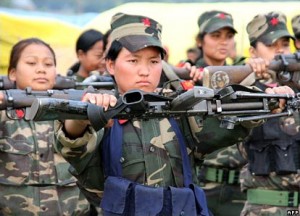
Meanwhile, in Nepal right now, the capitalist state is headed by a party with a much more radical reputation than the mainstream Communist Parties in India. Leading the coalition government in Nepal is the Unified Communist Party of Nepal (Maoist), the party which from 1996 carried out a heroic decade-long guerrilla war – along with a mass campaign of general strikes and agitation – against the brutal capitalist Nepalese monarchy. Largely due to all these efforts, Nepal’s monarchy was toppled in 2008. The Unified Communist Party of Nepal (Maoist) was hugely popular for its struggle against the ruling order and in the April 2008 elections it won the most seats (but not a majority.) However, lacking a definite program for working class state power, the Unified Communist Party of Nepal (Maoist) instead sought to head up the government running the capitalist state. This is what, in fact, it did do for a year until the party was toppled from government in May 2009. However, since August 2011 the Unified Communist Party of Nepal (Maoist) with its vice chairperson, Batturam Bhattarai, as prime minister has again been heading the Nepalese government.
It’s important to understand that the Unified Communist Party of Nepal (Maoist) running the capitalist state apparatus isn’t just a problem from only an abstract, theoretical point of view. The party is heading up and thus taking responsibility for the very same army and army officers that brutally murdered anyone suspected of being a Maoist sympathiser during the Civil War. It is acting as the patron of the very same security forces that have conducted – and continue to conduct – terror against the poor peasants on behalf of landlords. In heading up the capitalist state institutions, the Unified Communist Party of Nepal (Maoist) has naturally been able to do little to tackle the terrible inequality and oppression of low-caste people and women in Nepal. Instead, the government has been welcoming capitalist investment from and, in general, being drawn closer to Washington’s main ally in South Asia, India. All the while, the Nepalese masses continue to suffer rampant unemployment, high inflation, shortages of necessities and frequent power cuts.
Being at the apex of the capitalist administration has naturally also corrupted several Unified Communist Party of Nepal (Maoist) leaders who have been accused of lapping up the luxury associated with their newly acquired capitalist government positions. It is little wonder that many of the former guerrilla fighters who gave everything for the party’s struggle are disillusioned. Last June, many cadre of the Unified Communist Party of Nepal (Maoist) split from the party accusing it of betraying its original goals. These cadre formed the CPN (Maoist) and have recently promised to lead a “people’s revolt” against the Unified Communist Party of Nepal (Maoist)-led coalition government.
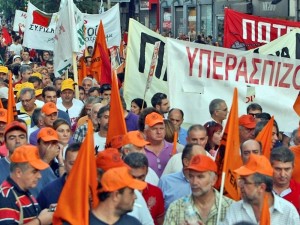
An Urgent Need for a Revolutionary Perspective
If the intention of radical socialist parties to govern capitalist states is harming the prospects for socialist revolution in Nepal, it is doing equal harm in various parts of Europe. Today, in countries like Greece, Spain, Portugal and increasingly Italy the capitalist economic crisis is so deep and working class people so enraged by massive unemployment and plummeting living standards that the potential to pose a revolutionary socialist solution is immense. In Greece in particular, a deep six-year long recession and harsh austerity measures imposed to satisfy European bankers have led the working class to wage desperate struggles. The last few years have seen Greek workers unleashing repeated general strikes and workers and their allies have been involved in pitched battles with riot police. The situation cries out for an authentic communist party to lead the working class masses in establishing organs of workers’ power – independent of the capitalist state – that can then begin to vie with capitalist institutions for power. Such a party would organise mass worker occupations of utilities and other enterprises targeted for privatisation, would build committees linked to workplace worker organisations to organise food distribution to the poor – including through workers directly requisitioning food from capitalist enterprises – and would work to ensure that workers’ defence guards are formed to crush the growing fascist threat and to defend workers and left demonstrations from police attack. However, diverting workers and their allies from such a perspective to transition towards revolution is the emergence of a powerful left social democratic party, Syriza, that promises the masses salvation through the parliamentary process.
A coalition of openly social democratic and nominally far-left groups, Syriza captured close to 27% of the vote in the June 2012 parliamentary elections. It ran on a program that included aspects beneficial to working class people such as free breakfast and lunch for public school children, nationalisation of the banks and nationalisation of ex-public companies in strategic sectors. However, it promoted the idea that its array of progressive reforms could be brought to economically plummeting Greece simply by electing Syriza to office and backing it with mass campaigning. Thus, the Syriza program has no mention of the need to sweep away capitalist state power or even of the need to dispossess the capitalist exploiting class as a whole. Indeed, the extent to which Syriza accepts the existing capitalist order is shown by the fact that it wants to retain Greece in the European Union. The problem with that is not the idea per se of being in a union with other European countries but the fact that being in the current EU necessarily means Greece succumbing to the anti-working class diktats of the German and French capitalist bankers to which the EU is indebted. Thus, Syriza while rejecting the current bailout/austerity Memorandum agreed to between Greek and Euro politicians and bankers, seeks only a new bailout agreement on better terms. It accepts the “need” for Greece to later repay debts to the leaching capitalist banks. It is indicative too that Syriza’s program accepts the maintenance of detention centres to imprison immigrants, calling only to, “Guarantee human rights in immigrant detention centres.” At a time when the Greek working class masses are desperate and seething with the spirit of revolt, the most harmful thing that could be done to the struggle for socialism is to lull the masses with promises that their sufferings could be ended by simply reforming the existing capitalist social order.
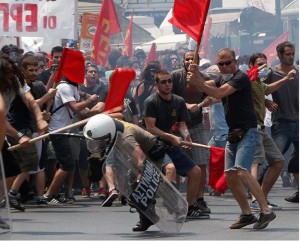
direction.
However, it is crucial to have a revolutionary perspective not only in those countries like Nepal, Greece and Spain where the prospects for revolution are currently greatest. Some pseudo-Marxist groups like to argue that the difference between the social democratic and revolutionary Marxist programs does not become relevant until a revolution is immediately posed. This is utterly false! A workers movement could never seize state power when social conditions open up the possibility of such a transformation unless its most politically advanced layers have been trained, during the whole preceding period, to remain steadfastly independent of, and opposed to, all institutions of the capitalist class. These most politically conscious sections must be trained, through the course of struggles for immediate gains, to only trust the power of the working class united with all of the oppressed. If, on the other hand, the struggle for immediate improvements is waged on a strategy that looks for justice from the pro-capitalist parties and capitalist state organs then not only will the masses’ revolutionary training be subverted but the struggles for immediate victories will be doomed to fail. The resulting demoralisation will further retard progress towards socialist revolution.
That is why it is crucial right now that every key issue be addressed from the standpoint of an overall revolutionary perspective. This is at least as important as the vital work of theoretically outlining the need for socialist revolution. However, it is a lot harder to do. For in concrete issues of the day, the pressure for nominally Leninist organisations to bend to the social democratic impulse is greatest. That is why even many socialist groups that theoretically criticise the notion of the parliamentary road to socialism are themselves guilty of breeding illusions in the capitalist state when they offer a program to address the hot issues of the day. Take, for instance, the Socialist Alternative (SAlt) group. SAlt define themselves as a group that has “a clear cut revolutionary program” as opposed to the Socialist Alliance. Indeed, the group that is scheduled to soon merge with SAlt, the RSP, has made some very sharp and correct criticisms of the reformist program of the Socialist Alliance. Yet like Socialist Alliance, SAlt cheered the electoral successes of Syriza. A 19 June 2012 article in the Socialist Alternative journal titled, “Narrow Loss for Radical Left in Greece”, states:
… it was so important for the left to unite behind SYRIZA in the election campaign.
… the rise of SYRIZA has had an extraordinary effect on Greek politics, and opened up major opportunities for the left. We now have in Greece something unique among Western countries: a situation where the main opposition party actually puts forward a fundamentally different political program to the government.
All this enthusing without any acknowledgement that Syriza is breeding illusions that the masses’ suffering could be ended through reforms within the capitalist state structure! Indeed, an earlier 11 June 2012 article issued by Socialist Alternative just days before the elections, “Greece: The Making of Syriza,” hails Syriza’s “slogan in favour of a ‘government of the left.’” In other words, the article cheers Syriza’s wish to administer the existing, capitalist state.
It is not unexpected that SAlt should wildly cheer Syriza and its reformist program given that, here in Australia, SAlt sometimes supports associations grouping together those key enforcers of the capitalist order – the police. The attitude to the police – and to police associations – is a crucial issue for socialists because police are at the very core of the capitalist state. The police force was created for the very purpose of maintaining the rule of the exploiting classes and additionally, in Australia, to enforce the dispossession of Aboriginal people. Acts of fighting genuine crime are secondary to this basic function of the police and other repressive arms of the state. Every generation of the police since its founding has been recruited and trained for the purpose of maintaining a status quo based on exploitation of the toilers. Meanwhile, police personnel are shaped by their regular “work” in maintaining capitalist order: from their attacks on striking workers’ picket lines to their harassment of the homeless, from their racist terror against Aboriginal people to their repression of leftist demonstrators. Every major intervention by police in a social conflict such as the police mobilisation against workers’ pickets during the 1998 MUA waterfront workers struggle or the more recent cop attacks against left-leaning Occupy Sydney protesters becomes part of the tradition that is stamped on the police force. That is why it is such an important principle for communists that police in a capitalist country (and their associations) are absolutely kept out of the left and workers movement – out of our organisations and out of our struggles.
Now at times SAlt have taken the right stance with respect to Australia’s police. Thus at a 12 November 2011 Occupy Sydney general assembly SAlt, to its credit, joined with us in Trotskyist Platform and some “non-aligned” activists to argue against – and vote down – a motion supported by liberals, reformist “socialists” and conspiracy theorist-types that Occupy Sydney support an upcoming NSW police rally over injury compensation (see Direct Action, Issue 37 article, Can Police Be Part of the 99%?) Yet not much earlier, SAlt was welcoming the presence of police participants in the NSW public sector workers’ rallies against state premier O’Farrell’s attacks on wages:
The PSA has instituted overtime bans, and other unions will also roll out various forms of work-to-rule and work bans. The Police Association has indicated that it will stand with other public sector unions, despite the exemption of police from the changes at this stage. Unions NSW has of course talked about a community campaign similar to the “Your Rights at Work” campaign against WorkChoices. They need to start calling mass rallies.
– Socialist Alternative, 6 June 2011
As we explained in a leaflet distributed at the 15 June 2011 workers’ rally in Sydney:
Whatever their original class background, when a person becomes a police officer or a prison guard they have chosen, however consciously at the start, to become the paid servants of the exploiting elite. Just like a scab who crosses picket lines. If the police get better working conditions that only makes them better fed and better rested to repress our struggles. Now some may think: well if the police squabble with their masters all the better for us. Well let them squabble but keep them out of our struggles! Any apparent numerical “benefit” that would come from having the Police Association at our union rallies is far, far outweighed by the harm that it does. For one their presence repels the most downtrodden in society – Aboriginal people, the homeless, struggling tenants and not to mention union militants within industries like construction who have faced police attacks – who are all precisely the community members who will most energetically stand behind a union campaign against the powers that be.
Moreover uniting with the Police Association confuses workers as to who their friends are. It is critical for workers to understand that – especially when the capitalist rulers are in a crisis and thus unwilling to compromise – it is the police who will be unleashed to smash workers. Recently in Spain, firefighters have had to defend themselves from violent attacks from heavily armed cops. In Greece public sector workers rallies have been on the receiving end of massive cop assaults. It is intolerable that we have a situation in the NSW union movement where the people who would be unleashed to smash our struggles are sitting in the same union meetings as us. Far from being embraced, the Police Association and the prison guards need to be separated out of our unions.
Police will only be on our side after this capitalist state has been swept away and a brand new state and police force is constructed – one with new personnel, new structures and new traditions all in the service of the working class. Until then we need to be absolutely clear that all the institutions of the state – the police, courts, prisons, the IRC – are on the other side of the fence.
– Crush the NSW Government’s Attacks on Public Sector Workers. Reprinted in Trotskyist Platform, Issue 14.
One of the key tasks of Marxist activists is to consistently bring to the working class and the oppressed an understanding of the nature of the capitalist state and the need to oppose it. Now, this will not be achieved by just shouting the word “revolution” very often. It will also not be achieved alone by writing nice articles explaining the need to sweep away the capitalist state – although that is certainly necessary too. What is most crucial is that in every progressive struggle, communists must not only be in the forefront of the actions but must propose a strategy that encourages the participants to only trust in the united power of the working class-led masses. In other words, we must advocate a strategy that pushes the struggle to seek complete independence from and hostility to all arms of the capitalist state. This must be the case whether it is a struggle initiated by ourselves or progressive struggles that we are joining initiated by social democrats or others – like the Occupy protests or the public sector workers’ stopwork rallies.
The struggles for immediate gains for working class people must be today waged in such a manner that they in turn advance the struggle for the future revolution. To help activists build the theoretical clarity needed to guide today’s struggles in such a way, we reprint the following article, written in 2007 for Trotskyist Platform, Issue 7.
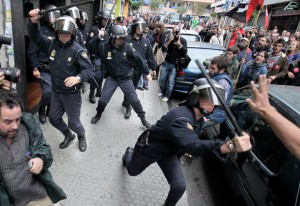
The Nature of the State and How to Fight for the Transition to a Socialist Society
February 2007 – The horrors of capitalism drive the masses to seek an immediate solution to their suffering. Workers are naturally compelled to unite with their fellow workers to wage class struggle against their common exploiters. But intimidated by the threat of copping state repression for engaging in struggle and influenced by the fear of victimisation at work for spearheading militant industrial campaigns, many look, at least partially, to an easier sounding solution: change the individuals heading the government. Unfortunately, changing the personnel administering the capitalist state will bring no fundamental or durable social change. This is crucial to understand, especially right now, when many working class people hope that the approaching federal elections present a means to put an end to the union-busting and racism of the right-wing Howard government.
The reason that a change in composition of parliaments will bring no significant social progress is because the problem with capitalist societies is not, in the main, the particular nature or values of the people in government (although they do stink) but the inherent nature of the whole system that governments administer. The system we live under is one where the things needed for production – the factories, mines, land, banks, communications infrastructure and so on – are not owned by the whole of society but by a small few, the capitalists. Among the big capitalists in Australia are James Packer, Richard Pratt, Chris Corrigan, Frank Lowy and family and Kerry Stokes. These big businessmen use their ownership of companies to amass great wealth, not through their own labour, but through exploiting the labour of others, the labour of the workers whom they hire. The drive of these capitalist bosses for ever greater profits compels them to make workers work ever more hours for the same pay, to slash workplace safety, to continually bully employees and to increasingly deny workers any ability to know when they will have time off … and when they will be working.
This economic system necessarily creates an extremely ugly and brutal society. For the rich ruling class can only maintain their domination over the masses that they rob by dividing working class people through fostering racism and other backward ideas. The system has also created a world “order” in which the capitalists of the richer countries exploit not only the workers in their own countries but rip off, at an even greater rate, the toilers of the poorer countries. And such colonial-style looting is enforced through colonial-style violence. In the last period not only have the Australian military been participating in the bloody U.S.-led occupations of Iraq and Afghanistan but Australian troops and cops have been directly enforcing imperialist domination in East Timor, the Solomon Islands and Tonga.
To open the road to an egalitarian society requires taking the key means of production out of the hands of the capitalists and making them the collective property of the entire people. Production will then no longer take place according to what makes the most profits for individual rich businessmen but will be planned according to the needs of the masses. This is what is meant by a socialist system. Such an economic system will pave the way for a world where everyone can have access to quality health care, education, childcare and housing. And it will eliminate the economic conditions that fuel racism and that underpin the oppression of women.
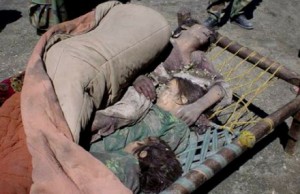
Given that socialism will so obviously improve the lives of the vast majority, why is capitalism so hard to get rid of? Firstly, the capitalist rulers are able to use their control of the economy and enormous wealth to politically influence and deceive the masses. They own the media and publishing firms, can massively fund political organisations that serve them (as well as “independent” think tanks) and can much better afford to hire meeting rooms and put on fancy benefits at plush venues. Deploying all these means at their disposal, the exploiting class promotes the lie that capitalism is inevitable and “in accordance with human nature.” Then they divide the masses with nationalism and racism and foster a work culture that encourages workers to see fellow workers as rivals instead of allies. Religion is encouraged since it dampens the class struggle, with the belief that everyone, even the cruel exploiters, are “god’s children.” Meanwhile, religion encourages the downtrodden to gracefully accept their earthly suffering with the promise of a glorious, supposed “after-life.”

Most importantly, the capitalist ruling class have an organisation of repression, a state, which they use to intimidate and quash resistance struggles. This capitalist state consists of special bodies of armed men, chiefly a police, standing army and intelligence agencies, together with their legal and political institutions, courts, prisons etc. Russian revolutionary leader V.I. Lenin emphasised the class nature of the state:
According to Marx, the state is an organ of class rule, an organ for the oppression of one class by another; it is the creation of ‘order,’ which legalises and perpetuates this oppression by moderating the conflict between the classes.
… under capitalism we have the state in the proper sense of the word, that is, a special machine for the suppression of one class by another, and, what is more, of the majority by the minority. Naturally to be successful, such an undertaking as the systematic oppression of the exploited majority by the exploiting minority calls for the utmost ferocity and savagery in the matter of suppressing …
– The State and Revolution, Lenin (August 1917)
It is crucial to understand that the state under capitalism serves the exploiting class irrespective of whether the capitalist state takes the form of monarchy, fascism or parliamentary “democracy.” Lenin stressed that parliamentary “democracy” in a capitalist state is always a bourgeois (i.e. capitalist) democracy:
Bourgeois democracy, although a great historical advancement in comparison with medievalism, always remains, and under capitalism, cannot but remain, restricted, truncated, false and hypocritical, a paradise for the rich and a snare and a deception for the exploited, for the poor …
The toiling masses are barred from participation in bourgeois parliaments (which never decide important questions under bourgeois democracy; they are decided by the stock exchange and the banks) by thousands of obstacles …
– Proletarian Revolution and the Renegade Kautsky, V.I. Lenin (October-November 1919)
The Capitalist State and The Illusion of an Institution that Maintains “Order on Behalf of All Citizens”
States have not always existed. Before human societies were divided into classes the state had not arisen. Order was maintained by the self-acting population but there was no special institution maintaining order that was separate from the population, i.e. there was no state. But when classes arose, order could no longer be maintained by the collective action of the whole population. For the population itself was now divided into irreconcilably hostile classes, into exploiter and exploited. Originally this division was between slaveowner and slave, then between feudal lord and serf and then, under capitalism, between capitalist owner and wage labourer. In each case, the exploiting class had to have a special means of physically enforcing “order” that would serve only itself as against the exploited majority. For this purpose they fostered the development of a state.(1)
The question arises: why does the greedy ruling class need a state to enforce its interests and not instead simply pay private armed guards? After all that is what the Patricks Corporation did in 1998 (sparking off the big waterfront dispute) when they hired armed security thugs against maritime workers. The answer is that the exclusive use of such private forces would make it too obvious to the oppressed masses that the forces “keeping order” in society are in fact there only to serve the big end of town. The beauty of the state as a means of keeping exploiting classes in power is that, by being somewhat alien from and standing above all of society, the state acquires for itself a society-wide legitimacy that masks who its true masters are. In feudal society, the noble landowners were protected by a monarchy, which proclaimed itself the executors of “god’s will on earth.” Today capitalist states protect the exclusive interests of the corporate bosses while claiming to be defending the “rights of all” and to be fighting crime. Now, when corrupt state forces are not actually in cahoots with mobsters, they occasionally do nab a genuine crook. But this only distracts from the fundamental class purpose of the capitalist state, the intent for which it was founded and the intent for which it exists today. From violent police attacks on picket lines of striking workers, to racist state killings of Aboriginal people in custody to sinister ASIO spying on anti-capitalist protesters, it is apparent that the personnel of the Australian state have been trained and indoctrinated for the very purpose of enforcing the unjust current social order. And every time the capitalist state mobilises to suppress a major resistance struggle by the oppressed, the state’s armed personnel become more hardened – they become more committed to serving their class purpose – and those who subsequently choose to enlist in the state forces become more conscious of the aims of the institutions that they are joining.

The role that the state armed forces and bureaucrats play in enforcing capitalist rule means that these personnel are able to carve out for themselves a privileged position in society. They demand a share of the loot from their capitalist masters for the “job” they do for them. Military officers, SAS special forces, judges, crown prosecutors all get big salaries. Military and police get lots of decorations and official fêting too.
This mutually beneficial relationship between the actual capitalists and its military-bureaucratic elite enforcers is tightened into an unbreakable alliance through thousands of interlocking networks. Current and former company directors hold posts on the boards of state bureaucracies and university administrations and are commissioned to conduct “independent” reports to “advise” government policy. And, of course, the reverse happens all the time too. Just look at Bob Carr – shortly after resigning as NSW premier in 2005, Macquarie Bank announced his appointment as a “part time consultant.” Apparently, he “would make a valuable contribution to the development of Macquarie’s global businesses”, something that Carr, no doubt, had plenty of experience of already whilst running Australia’s most powerful capitalist province for so many years. This is a standard you scratch my back and I’ll scratch yours situation. State officials are fêted as guests and invited speakers at extravagant corporate functions. And corporate bigwigs are joined by judges, politicians and defence top brass in swilling together like steroid-fattened swine at exclusive clubs, house parties and private school “old boys” events. Their children are encouraged to and often do marry each other.
At the same time, the capitalist state goes to significant lengths to appear “independent” of the rich possessing class. If the workers struggle becomes powerful, the state may even take a small measure or two that may appear to favour the masses over the corporate elite. Such a move would be only so that the state can restore its legitimacy in order, when it needs to do so, to come down with maximum brutality against the uprising workers. That is why the effectiveness with which the oppressed fight for their liberation depends, in good part, on how well its most advanced political layers can expose the true nature of the current state as an instrument exclusively serving the exploiting class. Working class activists need this understanding not only for the ultimate struggle to sweep away capitalism but need it for all the immediate struggles of today too. The fight to defend workers’ rights, to oppose racist cop attacks on Aboriginal people, to stand against imperialist militarism and to enforce the right of Muslim and non-white people to safely use public areas demands strategies that avoid reliance on the capitalist state.
Leninism versus Social Democracy
The attitude to the state is the most important and contentious issue faced by anti-capitalists. If pro-socialist people from different groups, including some rank-and-file workers on the left of the Labor Party, were asked to outline their future ideal society, there would be little difference between the visions we present. But the key question is how to get to such a society and what stance must be taken on the events of today! And because the contending left tendencies have conflicting attitudes to the capitalist state, these various parties inevitably end up not only with different programs on current questions but, on some key issues, we actually end up on opposite sides of the barricades.
For the last 100 years, conforming roughly to the time from when capitalism ceased to be capable of achieving social progress, the working class movement has been politically split between a revolutionary left wing and an anti-revolutionary right wing. This split is irreconcilable! On the left wing of the split stand the communists, in particular those who stand by the tradition of Lenin and Trotsky’s Bolsheviks that led the 1917 Russian Revolution. Leninists understand that to begin the transition from capitalism to socialism requires the exploited masses to smash the existing capitalist state machine through revolution. On the other side, the right wing of the workers movement, calling itself the “social democracy”, claim that it is possible to get to an egalitarian society by simply using parliament within the existing state to make fundamental reforms. To the extent they admit that the state under capitalism is actually a capitalist state and not a class neutral one, they contend that this apparatus can gradually be reformed into a pro-working class state from within. Examples of mass social democratic parties include Lula’s ruling Workers Party in Brazil, the Italian Party of Democratic Socialism (which is part of that country’s ruling coalition government) and the French Socialist Party. Although few prominent leaders of the Labor Party here will even talk favourably about socialism in public these days, the ALP is a type of social democratic party, albeit a very right wing and particularly white nationalist one.
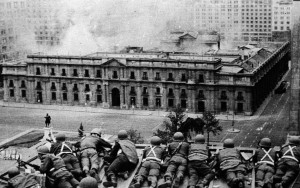
Communists’ insistence on the need for revolution is not based on any romantic notion of revolution. Indeed we recognise that it would be easier and require a lot less sacrifice if it was possible to simply lay hold of the old capitalist state machine and modify it to serve the goal of socialism. But the whole point is that it is NOT possible! It is completely impossible to turn the state that was created and built up to serve the capitalist class into an instrument against capitalism. Instead, the state’s high-ranking personnel, who are heavily intermingled with the corporate owners and who owe their very privileged social position to capitalism, would inevitably lead desperate resistance to any attempt to move away from capitalist rule. These officials would readily dump all “democratic” rhetoric and would organise the most bloody violence to crush any working class bid to run the state. Therefore, as Lenin repeatedly insisted, the struggle for liberation of the toiling masses requires the “revolution ‘concentrate all its forces of destruction’ against the state power and to set itself the aim, not of improving the state machine, but of smashing and destroying it” (State and Revolution, August 1917.) Only once the state apparatus defending capitalist exploitation is shattered will it be possible to transfer the means of production to social ownership and will it be possible to begin the long transition towards a socialist society.
In contrast to this revolutionary program of communists, the fundamental strategy of social democratic parties is to get elected to head parliamentary governments within the existing, capitalist state. In pursuing this goal, the political conviction of social democratic leaders that this is the best way forward gets mixed in with naked personal ambition. Getting into governmental office or becoming an appointee or adviser to those in office is not only a source of considerable privilege but often brings with it connections that later allow one, or one’s relatives, to leap into the actual corporate elite. We all know about how former union leader Bob Hawke became an anti-working class prime minister of Australia. A later ACTU head, Bill Kelty, became a board member of the Reserve Bank and then a Director in trucking magnate Lindsay Fox’s business empire. But it is not only long-time sell-outs who have taken this road. Many a one-time, determined pro-working class fighter (including some who have endured imprisonment for their struggle) who but lacked a clear revolutionary attitude to the state has been lured into becoming part of the capitalist state apparatus … and from there some have even jumped into becoming direct exploiters themselves. This path was, for example, travelled by two of South Africa’s best-known, pro-socialist workers’ leaders. Moses Mayekiso and Jay Naidoo once bravely endured repression during the apartheid days but via stints as state officials in the “new” but still brutally capitalist South Africa, both eventually ended up becoming outright capitalists themselves.
To the extent that social-democratic leaders’ promises of pro-socialist parliamentary reforms are not a conscious or semi-conscious deception of their working-class support base, these promises are vain and utopian. For no matter who sits on the government benches of parliament in a capitalist state, the actual bureaucratic-military apparatus that the government presides over is, congenitally, a capitalist machine. A sailing ship will not fly even if you install an aircraft pilot as its captain! Similarly, the capitalist state machine will never operate in the service of the working class no matter how “socialist” the government ministers happen to be.
In reality, when a party standing on a left-wing program appears likely to gain a parliamentary majority, the big business-owned media and the state bureaucracies would threaten to sabotage its campaign if the party did not in advance guarantee capitalist property rights. If the party still won the election it would be pressured by the state bureaucrats and armed personnel it supposedly presides over to either junk its program or face, firstly open sabotage, and then … removal. In practice, social democratic parties in government do everything to avoid antagonising the bosses and their state and thus usually end up being little different to right-wing conservative regimes. The last ALP federal government in Australia presided over attacks on the poor. It weakened the unions thus paving the way for the Coalition’s extreme anti-working class measures of today.
Accepting the capitalist state as a potential vehicle for progressive social change inevitably means that social democratic organisations end up vicious opponents of any resistance to this state. Around the world social democrats in government have violently attacked anti-capitalist struggle. In Australia, it was Labor governments that despatched troops against the big 1949 miners strike and which in the mid 1980s smashed the militant BLF builders labourers trade union. And today’s state Labor governments (especially in NSW and Queensland) are notorious for supporting racist cops who have killed black people in custody and for persecuting those Aboriginal people who have courageously fought back in response to these atrocities.
Social democratic loyalty to a capitalist state means loyalty in times of war too. In Germany, the previous Social Democrat Party/Greens government greatly expanded that country’s remilitarisation by sending a big contingent of German troops to take part in the NATO invasion of Afghanistan. Here, the last Hawke-Keating ALP government despatched Australian troops to take part in the first Gulf War slaughter of Iraqi peoples in 1991. Today, ALP politicians do make promises to pull out Australian troops from Iraq within an unspecified “fixed” timeframe. Yet the ALP continues to strongly defend the Australian occupation forces against Iraqi resistance fighters, backs Australian intervention in the bloody Afghanistan war, calls for increased military spending and enthusiastically supports colonial expeditions in the South Pacific.
Even by the standards of social democracy, the ALP is of course very right wing. But even a lot more left-wing sounding parties around the world that have adhered to the non-revolutionary road have been little different in government to the ALP. In India, Communist parties in several provinces have on many occasions been elected to head governments. In the region of West Bengal, which includes Calcutta, the Communist Party of India (Marxist)-led Left Front was earlier this year returned to office for the seventh time in succession. But yet in West Bengal, as in the rest of India, the workers and poor peasants continue to suffer terrible capitalist exploitation while ethnic minorities face brutal persecution.
On rare occasions, left parties elected to government in capitalist countries have had the resilience to actually try and implement at least some aspects of a pro-working class program. Where this has led was seen dramatically in the events of the early 1970s in Chile. The events unfolded during a world period shaped by the fact that the U.S. was losing the Vietnam War to communist forces. And the Chilean workers were in a fighting mood. In that context, socialist leader Salvador Allende was elected as prime minister of Chile in 1970 despite a big counter campaign orchestrated by the U.S. CIA. While not taking away the power of the capitalists, Allende instituted some progressive reforms, which infuriated the capitalists. Within a few years things came to a head. The Chilean toilers could sense that reactionary forces were plotting a right-wing coup and thus they began to prepare themselves and in some case started to take over the factories and farms. But Allende discouraged the workers from arming, telling them to trust the “loyalty to the constitution” of the military officers. Chile was to be the showcase of the “peaceful path to socialism.” But the real loyalty of the military officers in Chile, as in other capitalist countries, was not to any constitution but to the capitalist class to which they were tied. In September 1973, Commander-in-Chief Augusto Pinochet led a bloody CIA-backed military coup that overthrew the Allende government. Thousands of leftists were rounded up and murdered. Pinochet ordered fighter planes to attack La Moneda, the presidential palace where Allende had courageously barricaded himself. Allende, a heroic but tragic figure, was killed there.
Pinochet’s seventeen year reign became synonymous with torture and “disappearances.” Chilean leftists responded with a courageous underground struggle against the military. But Pinochet died of natural causes recently still having escaped justice from the Chilean masses. Currently, Chile’s elected president is “socialist” Michelle Bachelet. She was herself a political prisoner under Pinochet as was her father who was tortured and died in custody. But today Bachelet goes out of her way not to antagonise the local and U.S. capitalists and thus offers little for the long-suffering Chilean toilers. Disgustingly, the butcher Pinochet’s recent funeral was adorned with military honours. Meanwhile, the Chilean workers continue to suffer capitalist exploitation and the indigenous Mapuche Indians continue to be terribly oppressed, this time all under a “red” president. Events in Chile have once again proved that there is no “parliamentary road to socialism.” Indeed, in no country in the world has the means of production ever been transformed from the capitalist mode to the collectivised mode without the shattering of the existing capitalist state.
Although social democracy is a completely failed program in terms of achieving the ultimate goals it promises workers, it and other movements claiming to be able to fundamentally reform capitalism still hold big sway among the world’s workers. And while capitalists do not really like anyone who claims to stand for workers’ class interests, if the exploiters feel that the masses are threatening their rule, social democracy is often their last line of defence. The bosses would seek to get socialists in as part of governments in order to placate the masses, dull their independent political energy and most of all save the capitalist state from overthrow. Then, when the masses have had their militancy dissipated and their spirits sapped by their own “socialist” leaders’ failure to meet their aspirations, the capitalists will seek to dispense with the left and go on the offensive.
This tragic scenario has been played out time and time again throughout the world. That is why exposing the bankruptcy of social democracy is a key part of the fight for liberation of the oppressed. This is essential not only for the final triumph of socialism but in order to maximise the chance of success in every major struggle of today. Take, for instance, the campaign against Howard’s draconian anti-worker Industrial Relations laws. Hundreds of thousands of workers have defied the danger of workplace reprisal to take industrial action against these laws. But pro-ALP union and parliamentary leaders have diverted this struggle into a Vote ALP strategy. This was exemplified by the main slogan at the November 30 union rallies, “Your Rights at Work Worth Voting For.” This strategy not only sets up workers for future disappointment but it rejects the militant class struggle methods of strikes, pickets and plant occupations, through which unions achieved past gains.
Exposing social democracy is of course not just a matter of exposing individual self-serving, ambitious ALP politicians. That is all too easy. It is necessary to defeat all illusions that the capitalist state can be made to serve the downtrodden masses. Paradoxically, it is often the more left-wing social democrats and the ones who more honestly believe in their own program that are the most harmful to workers’ interests since they have more credibility with the masses and thus can more effectively derail struggles.
It is crucial to also have a correct attitude to the number of socialist groups that stand at various points between right-wing social democracy and communism. Typically, the members of these groups subjectively identify with Leninism while the political inconsistencies in the group make them often, in practice, bend to the average “public opinion” created by the ruling class. Examples of these groups include Socialist Alliance, the Communist Party of Australia and Socialist Alternative. It is necessary, on the one hand, to encourage these groups when they take a stance decisively to the left of mainstream social democracy but, on the other hand, to resolutely criticise any demands they make that promote loyalty to, or illusions in, organs of the capitalist state.
When a class struggle radicalisation of the masses does take place, a mass communist party could be formed through winning to a revolutionary perspective the best activists from within the unions and from within left-moving trends inside then-existing socialist, and other progressive, groups. But such an outcome greatly depends on there already being a hardened nucleus of Leninists that revolutionary forces would regroup around. Trotskyist Platform strives to help build this nucleus by working hard to bring to the most left-wing workers and youth a consistent revolutionary strategy and by doing its best to help activists to gain serious practical training in organising the urgently needed political struggles of today.
The mass revolutionary party that we need would, of course, have to be constructed in political competition with Laborite social democracy. In the heat of big social struggles, a socialist workers party would fight to win the leadership of the toiling masses by proving to them the need to oppose the entire capitalist system and the need to oppose the state that enforces capitalist rule.
Elected Workers’ Councils: Soviets and The Example of the 1917 Russian Revolution
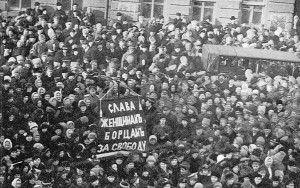
When considering the socialist program, serious activists working out the way forward for the struggle often ask themselves questions like: What does a revolution actually involve in practice? And after the masses sweep away the capitalist state, what should they replace it by? Fortunately, these questions can be answered not only by the crucial arsenal of theoretical works but by the experience of the October 1917 Russian Revolution. That Revolution was a truly momentous event: capitalism was swept from power in one-sixth of the earth’s surface.
The immediate prelude to the Revolution was a massive general strike that began with a strike of women textile workers on International Women’s Day 1917. The strike saw massive street demonstrations and workers militantly fighting back against murderous shootings by the police. The most significant result of this struggle (called the February Revolution) was that workers formed soviets, or elected councils. These soviets not only organised protest actions by the toilers but started to impinge on the authority of the government by in some cases giving orders about how the factories and country would run. There were then effectively two powers operating in Russia: firstly, the existing capitalist state and secondly, the newly formed soviets which were the budding organs of a new workers-run society. Naturally, the exploiting class and its military-bureaucratic personnel could not tolerate such a situation. Thus, they conspired with Commander-in-Chief Kornilov to launch a right-wing coup to drown the soviets in blood. But workers, led by Lenin’s Bolsheviks, thoroughly sabotaged the coup attempt by denying Kornilov’s forces supplies and transport. All the while the soviets were uniting together with the working class all the downtrodden layers of the urban population and in the countryside the peasants, inspired by the workers’ militancy, began to rise up against the landlords. And the peasant-based rank-and-file of the conscript army began to rebel against the officer corps. By the time October arrived, the ruling class was so overwhelmed by the organisational strength of the workers and by the massive support the militant workers had from the rest of the masses that many of their state personnel decided it was better not to resist the rising toilers. Many in the military elite were, however, simply biding their time as we shall explain below.
In order to begin the transition to socialism it was still necessary for the toilers to deal with the violent resistance of core elements of the capitalist state. And that they did in the October Revolution itself: armed workers and rank-and-file sailors and soldiers prevailed in battle against elite military units, military officers and junkers (trainee student military officers.) But the balance of forces was so favourable to the workers and the capitalist state forces were so isolated that the casualties during the actual revolution were small in comparison with other events of the time – in particular the horrific slaughter of World War I. (2)
If we are to look at the period of the Revolution from February to October 1917, we see that what made victory possible was the power that workers derive by the very way they, as wage earners, make a living. The fact that workers labour at workplaces that bring together hundreds and thousands of workers all suffering common exploitation gives them an arena in which to discuss their grievances and then organise political action in response. Furthermore, it gives workers the power to turn on or off industry and transport through collectively controlling their own labour. So, the February Revolution began with workers across industries in Petrograd (Russia’s then capital city) going on strike. A few months later, it was workers employment in, and knowledge of, strategic economic sectors that allowed them to decisively subvert Kornilov’s attempted military coup. As Kornilov’s forces attempted to transport troops and supplies by rail, the rail workers union sabotaged these attempts by arming union members and organising them to tear up the rail tracks. Railway switchmen often sent the coup’s troops and ammunition literally up the wrong tracks, either to dead ends or to the wrong destinations! The workers’ and peasants’ defence committees, meanwhile, were passed on vital information intercepted from the enemy by the telegraphers and postal workers. These workers also made sure they held up the orders of Kornilov and Co. and copied and widely publicised any information demoralising to the right-wing plotters. To keep the population informed, on the other hand, the printers union arranged for special issues of the newspapers and controlled the contents of the press to ensure that they were taking the correct side. Meanwhile, during the Kornilov coup attempt and afterwards, workers at arms and ammunition factories started taking away the produce of their plants and delivering them to the workers’ soviets, union committees and to the revolutionary Red Guard militia. Delegations of employees from the factories presented the workers organisations with gifts of guns, cannons and hand grenades with which to arm the masses. All the while, factory-based delegations led by the Bolsheviks were going out to the countryside to link up with the peasant struggles. And at militant worksites, workers organised groups of agitators to go to the barracks to try and win over the rank-and-file peasant conscripts in the army. As the toilers moved on to the front-foot politically, workers organisations began more boldly “interfering” in decisions concerning the workplace and production; and in doing so enhanced the unity of the working class and increased the confidence the broader layers of the masses had in the power of the working class. In the Urals and increasingly elsewhere, the local soviets and workers’ factory and shop committees set the wage scale, controlled the distribution of produced goods and began to organise production and start up previously closed-down factories. In many places the capitalists, starting to feel their power slipping away, had to be stopped from looting their own plants and openly sabotaging production (at a time when the war and economic collapse were forcing the masses into terrible poverty.) Then in October itself, as the workers-based Red Guards led the seizure of key points in the cities, jubilant workers and peasants held mass meetings in the factories and soviets to pass resolutions supporting the uprising and to further increase the dominance of pro-revolutionary activists in their elected organisations.
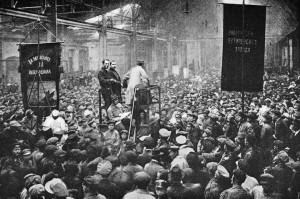
This victorious October Revolution took Russia out of the inter-imperialist World War, transferred the land from the despotic landlords to the peasants who worked it and gave national rights to the long-suffering non-Russian ethnic peoples. All refugees were granted the full rights of citizens, women were given the right to abortion, all laws discriminating against gays were removed and steps were begun to enable women to fully participate in economic and social life. The revolution proved in practice, for the first time, that the masses could collectively take over the means of production and it confirmed that it was not only necessary but possible for the toilers to sweep away the entire capitalist state apparatus.
But the revolution also verified and gave concrete meaning to long-understood Marxist projections of the difficulties a victorious working class would face. Chief among these was contending with the overthrown capitalists. After the 1917 Revolution the deposed exploiting classes regrouped and made a desperate, violent attempt to regain their power. Their efforts were led by generals in the old capitalist Russian army and were massively backed by direct military intervention by 14 overseas capitalist powers. Lenin generalised the dangers that the overthrown capitalists pose to any working class take over:
For a long time after the revolution the exploiters continue to enjoy a number of great practical advantages; they still have money (since it is impossible to abolish money all at once); some movable property – often fairly considerable; they still have various connections, habits of organisation and management, knowledge of all the ‘secrets’ (customs, methods, means and possibilities) of management, superior education, close connections with the higher technical personnel (who live and think like the bourgeoisie), incomparably greater experience in the art of war (this is very important), and so on, and so forth.
If the exploiters are defeated in one country only – and this, of course, is typical, since a simultaneous revolution in a number of countries is a rare exception, they still remain stronger than the exploited, for the international connections of the exploiters are enormous.
– Proletarian Revolution and the Renegade Kautsky, V.I. Lenin (October-November 1919)
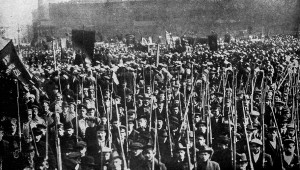
In Soviet Russia the overthrown exploiters and their imperialist backers were only defeated by the most heroic efforts of the Russian working people. The workers and poor peasants prevailed at great odds in a Civil War that lasted four years, ending only in 1921. In order to triumph against the former ruling class, the Russian masses had to organise a new state, a workers state. Repeating the lessons Karl Marx drew from earlier workers struggles, Lenin’s Bolsheviks, even before the 1917 Revolution, insisted that it would be necessary to create this new workers state after any victorious revolution:
“The exploited classes need political rule in order to completely abolish all exploitation, i.e. in the interests of the vast majority of the people, and against the insignificant minority consisting of the modern slave-owners – the landowners and capitalists.”
“… Revolution consists in the proletariat destroying the “administrative apparatus” and the whole state machine, replacing it by a new one, made up of the armed workers.”
– The State and Revolution, Lenin (August 1917)

The workers state created by October 1917 was, however, different to any state that had existed before it (with the exception of the Paris Commune.) For the first time in history, the state was an organ of rule of the poor, working-class people. So while the old exploiting classes were excluded from state power, in the new state the revolutionary masses exercised political power through a proletarian (i.e. workers) democracy of elected worker and peasant soviets. Through the soviets, average rank-and-file workers and village labourers were actually for the first time joining in directly administering the new state and for the first time these formerly downtrodden people had the liberty of holding mass meetings in the best buildings and the liberty of accessing the best printing plants. The communist program is that elected officials in a soviet government would be paid no more than the average wage of a worker and would have their position recallable at any time.
From the Overthrow of Capitalism to the Building of Communism

Suppressing the direct counterrevolutionary intrigues of the ousted capitalists is not the only purpose of a workers state. Long before the 1917 Revolution, Karl Marx explained some of the obstacles that would have to be overcome by a young workers state:
What we have to deal with here is a communist society, not as it has developed on its own foundations, but, on the contrary, just as it emerges from capitalist society; which is thus in every respect, economically, morally and intellectually, still stamped with the birthmarks of the old society from whose womb it comes.
– Critique of the Gotha Programme, Karl Marx (1875)
In particular, in a newly born workers state individuals from that section of the toilers that did not directly participate in the revolution – and therefore is not imbued with the same spirit of genuine solidarity as the active masses – could unconsciously undermine the new collectively-owned economy by partly behaving in the self-centred manner they have been raised to behave in under capitalism. This would include some trying to get an unfair share of distributed products or refusing to do their fair share for the new workers-run industry etc. Most susceptible to these practices is that layer of the masses whom Marxists broadly refer to as the petit bourgeoisie. This point requires some explanation. The petit bourgeoisie is defined as people who are neither exploiters of labour themselves nor who are wage labourers that are directly exploited together with other workers at a workplace. In today’s Australia this layer would include individual tradesmen and self-employed contractors, owner truck drivers, professionals, small farmers, non-labour hiring small shopkeepers etc. In Russia in 1917, the peasant masses who at that time made up the majority of the country were a petit bourgeois type layer. This petit bourgeoisie is a highly varied class arising from its intermediate position between the two decisive classes in society, the capitalist class and the working class. The more privileged strata of the petit bourgeoisie have realisable dreams of making it into the capitalist exploiting class. On the other hand, many poorer sections of this class (like some individual contractors hired by big companies) can be considered as semi-proletarians who suffer a form of exploitation that approaches the type endured by wage labourers. Significant sections of the petit bourgeoisie do indeed suffer under capitalism. They are bullied by the big capitalists that control the markets, leached by the banks, ground down by the general decay and terrible wars that the system brings and, especially in the likes of pre-revolutionary Russia, crushed by the tyranny of the landlords. Some petit bourgeois may be even poorer than workers and have a more unstable livelihood. Therefore, the poorer sections of this layer, especially, can and must be won to either actively supporting or accepting an anti-capitalist overturn. Individual petit bourgeois who are won to firmly supporting and identifying with the working class and who are convinced to turn their backs on all the prejudices of their own class background will play an important role in the struggle for socialism. But at the same time, the means by which petit bourgeois make their living, that is through “working for themselves,” conditions the broader mass of this layer to have a tendency (to the extent they remain individual businessmen) even in the new post-capitalist society to still want to look out mainly for themselves and to resist cooperation with an economy run for all the people. Some of them could continue their jealous petty rivalries with each other. And at worst some, even while being grateful to the revolution for freeing them from lying crushed and gasping under the boot of the big capitalists, could when the opportunity arises try and hustle a quick speculative buck at the expense of their fellow citizens. Since these elements live and mingle with workers such problems could start to have a corrosive effect on all the masses. Therefore an important task of the workers state is to patiently guide the petit bourgeois layers, to unite them in the new society with the workers and with each other; and at the same time to stop better-off individuals from coming under the sway of the overthrown capitalists or from becoming outright exploiters themselves. In effect what this means is that the organised mass of workers – the ones who have been already welded together in strong solidarity through the revolutionary struggle and through collective labour at the workplace – would lead the petit bourgeoisie class and the semi-proletarian layers as well as the less organised workers in the construction of the new egalitarian future.
Gradually, the petit bourgeois layers will become seeped in the cooperative spirit of the new society. Partly, this would be through being attracted to the example set by the unified worker masses now leading society. Partly, it would be through patient political education. But crucially, it will be because more and more of the individual producers will be convinced to join with their fellow citizens in collective labour in the new socialist-type enterprises. We shall here take a step back to explain this point. After the revolution, the major industries, mines, transport systems and banks will be taken away from the few big-time capitalists and placed under collective ownership and control of the labouring masses. But the numerous small and family businesses will be allowed to keep their own enterprises as long as they do not exploit other people’s labour. However, if such businesses form a big chunk of the economy, this is a situation fraught with problems in the long-term. Inevitably, a small number of individual producers will become quite rich while many others will be driven to ruin. Richer producers will start to, underhandedly, make struggling producers labour for them. The poorer ones will be forced to accede to keep afloat. All the while, the deposed capitalists who still possess their personal wealth, together with the capitalists still in power overseas, will be gleefully encouraging these processes. And they will try to make big money by using richer producers as intermediaries to make loans and by seizing control of poorer producers who have been forced into debt. In the long run, if this is all left unchecked, exploitation of labour threatens to make a gloomy comeback. To confront this danger the working class, once in power, would encourage individual producers to voluntarily join the collectivised sector. Such a program will get big assistance from the fact that individual producers who join as part stake-holders in the big socially-owned industries would gain a better and more secure livelihood than if they had remained small businessmen. This flows from the fact that in modern economies large-scale production is usually much more efficient than small-scale industry. It is worth noting here that in present capitalist society the size of the small business sector has been artificially inflated. In many industries maintenance workers, electricians and couriers have been laid off from their jobs only for the work to be subsequently outsourced to contractors. These contractors will often just turn out to be the former employees themselves now forced by circumstance to run their own contract business. The big capitalists drive this process for the sole reason that they want to break up workers from each other and stop employees from using union power to hold on to and bargain for better working conditions. Even though the individual contracting system is much less efficient from a technical point of view – with terrible duplication of equipment, lack of skill sharing, loss of economies of scale – it allows the big bosses to make more profits for themselves because they can force dependent contractors to work on call with no compensation and avoid paying shift rates, holiday pay etc.
Now, in a workers state one hurdle that the transition to a socialist economy in those sectors dominated by small producers can run into is the fact that many petit bourgeois have inherited from the capitalist past a distrust of the state economy since it was then coloured by bias in favour of the ultra-rich. To help entice small producers to move towards the socialist sector, the workers state will in some cases encourage individually-owned enterprises to first group themselves into cooperatives. Factory-based workers delegations and existing cooperative sector workers would organise meetings to explain to individual producers the advantages of forming cooperatives. Incentives like new equipment would also be given to encourage their formation. Small cooperatives give the former individual producer the chance to clearly see how in the collective economy the wealth really is shared collectively. A long process of participation in cooperatives, each gradually merging into bigger collectives, would help many formerly small producers towards a slow yet dependable transition into the fully socialist sector.
Gradually, as a higher and higher proportion of the masses embrace the socialist sector and help create the new society’s norms of solidarity and mutual assistance, more and more of the toilers will enthusiastically come forward to participate in the direct administration of their state. Meanwhile, the spread of workers’ power internationally will reduce the danger of capitalist restoration and will allow the development of the socialist economy and the elimination of poverty and economic insecurity. As society moves towards such a communist future, the need for even a workers state withers away. As Lenin explained:
Only in communist society, when the resistance of the capitalists has been completely crushed, when the capitalists have disappeared, when there are no classes (i.e., when there is no distinction between the members of society as regards their relation to the social means of production), only then ‘the state …ceases to exist’, and ‘it becomes possible to speak of freedom’ …. freed from capitalist slavery, from the untold horrors, savagery, absurdities and infamies of capitalist exploitation, people will gradually become accustomed to observing the elementary rules of social intercourse that have been known for centuries and repeated for thousands of years in all copy-book maxims. They will become accustomed to observing them without force, without coercion, without subordination, without the special apparatus for coercion called the state.
– The State and Revolution, Lenin (August 1917)
Now, as we know, the Soviet workers state (USSR) did not progress on to actual communism and that state did not begin to wither away. Nor could it have possibly done so while the richest, most powerful countries in the world remained under capitalist rule. Throughout the nearly 75 years of its existence, the pressure of world capitalism on the USSR was always intense and therefore the danger of capitalist restoration was ever present. But the revolutionary Soviet toilers saw that the 1917 revolution would eventually encourage workers’ revolutions around the world and that such victories would break the USSR’s isolation and provide much needed assistance for the development of the socialist economy. But when European socialist parties failed to take advantage of golden opportunities for revolution, especially in Germany in 1923, this led to heavy disappointment among Soviet workers. It was a kick in the guts for people who were terribly exhausted after the incredible sacrifices they had made to win the four-year-long Civil War. Many workers became politically demoralised and more conservative. This rightward shift amongst the masses in the mid-1920s, combined with the pressure of the vice-like grip of world imperialism, also led to a rightist, bureaucratic degeneration at the top of the Soviet state. But it is important to understand that while the USSR deformed under the pressure of hostile forces it continued to remain a workers state based on socialist-type property forms. Over the following six decades or so, the USSR built itself up from a backward country to one that was providing free health care and education for all, full employment and improved access to culture and science for wide swathes of its population. But bureaucratic abuses and the lack of proletarian democracy ate away at the political core of the workers state – the understanding amongst workers that this state based on collective economy was their state. With its strength of resistance thus sapped, the USSR collapsed in 1991-92 after U.S-led world capitalism succeeded in piling up enough pressure on it. But the effects of this terrible defeat only proved just how progressive the workers state, even in degenerated form, had been over capitalism. Capitalist counterrevolution brought homelessness, mass unemployment, racist state terror and attacks on women’s rights (as the article, Capitalist Counterrevolution Brought Poverty and Racism to Russia, in the Aug-Oct 2006 edition of Trotskyist Platform sadly elucidates.)
Fortunately, even now, capitalists do not rule the whole world. In Cuba, the anti-capitalist revolution has allowed the people of that once downtrodden, U.S neo-colony to be adequately fed and to enjoy one of the best universal health care systems in the entire world. The continuing legacy of the 1949 Chinese revolution has led to a big improvement in life for the worker and peasant masses there and a big advance in the social position of women. Yet in China and in Vietnam today, capitalists are making dangerous partial inroads into the economy (please refer to the article on China in the Aug-Oct 2006 Trotskyist Platform for an in-depth discussion of that deformed workers state’s present-day quandries.) Meanwhile, Cuba and North Korea face crushing economic sanctions/blockades and North Korea in particular is being bled dry by having to arm itself to ward off constant U.S.-led military provocation. In all these remaining workers states, the outcome of the class struggle – either the currently ruling (albeit in a deformed manner) workers retaining and rejuvenating their rule or the capitalists taking it back – is far from decided. And who wins the class war in these countries will both greatly influence the fate of the class struggle elsewhere and itself be conditioned by the success of the global class struggle.
Build a Systematic Understanding of the State Within the Working Class and All of the Downtrodden!
In summary, we can say the following: the capitalist state – its army, police, courts, prosecutors, prisons, and commissions – is not an “independent umpire” but an apparatus that serves the overall interests of the exploiting class. This is true whether this state takes the form of parliamentary “democracy” or of fascist dictatorship. This bosses’ state will violently resist any attempt by the workers to take over the means of production from the capitalists. Therefore, to open the road to socialism, the workers cannot simply lay hold of the existing state machine. As co-leader of the October 1917 revolution, Leon Trotsky explained: “The selection of personages in the old machine, their education, their mutual relations, are all in conflict with the historic task of the proletariat” (History of the Russian Revolution, 1930.) Therefore, to begin the transition to communism, the workers, leading all the oppressed, must sweep away the capitalist state.
Following such a revolution, the toilers will face bitter resistance from the overthrown capitalists, their ousted military-bureaucratic servants and their international allies. And the deposed ruling class will also seek to influence more privileged elements of the petit bourgeoisie to support their attempts to subvert the new society. In short, even after the initial ousting of capitalist rule, the class struggle between the toilers and the exploiting classes will still rage on (except that the revolution would have radically altered the balance of forces in favour of the working class) but in different forms. In order to win this class struggle, the revolutionary working class must build for themselves a new, workers state. This state, administered by the workers themselves, will defend the toilers’ newly won conquests against the overthrown capitalists and will patiently guide the middle classes. The final victory in the class struggle, through the eventual vanquishment of capitalism on a global scale and the development of a collectivised economy, will lay the basis for an egalitarian communist society. And as steps are made towards the achievement of such a society, the workers state, with its tasks approaching completion, will start to wither away as will all class distinctions themselves.

Now, a socialist revolution is not possible at any given moment of time. The majority of the toilers will not break out of the ideological walls imposed on them by capitalism and follow a radical path to liberation until a social shock has started to crack the foundations of the old order. But the capitalist system cannot but result in such crises. It is an inherently irrational system beset by a fundamental contradiction. That is, that in enterprises in the base economic sectors, the labour is performed collectively by large numbers of people whereas the ownership and control of industry are concentrated in the hands of a small class of profiteers. The mad scramble for profits in this system leads not only to massive inequality and economic crises but inevitably to terrible wars. Rival capitalist powers must fight each other for the right to loot cheap labour and raw materials from the poorer countries where most of the world’s people live. The desperate resistance of workers to being sent out to kill and be killed just for the sake of their greedy bosses’ profits is often a main force that pushes forward a revolution. And when seeking to escape the horrors of capitalism for the sake of their very physical survival and whilst burning with anger at the terrible injustices that capitalism brings, the masses will propel themselves to incredible heights of heroism in order to launch a new, rational and fair society.
Of course, understanding the erratic and unstable nature of today’s world does not mean that we should just sit around now waiting for the ideal moment for revolution. Nor does it at all mean that we should not support working class and progressive struggles today just because they do not yet have revolution as their aim. The only people who would act in such a way are fakes who are only looking for an excuse to avoid the sacrifices and risks of struggle today and who are kidding themselves that they would support a revolution in the future.
A social upheaval can only lead to revolution if there is, before the crises begin, already a significant section of the workers who are actively committed to anti-capitalist class struggle and if there is within this section of the class a vanguard layer that deeply understands the need to sweep away the existing state. Therefore, it is urgently necessary to work hard today to advance the fighting militancy of the workers, to strengthen their collective class-struggle organisation at the workplace (through building unions etc), to increase their unity across racial and national boundaries and to bring to them a systematic understanding of the state. This cannot be achieved by simply asserting revolutionary ideas from the sidelines. That is important but it is also essential to support and build up existing pro-working class and anti-racist struggles, to initiate new actions and to help the toilers gain confidence through achieving victories on political questions of the day. Most crucially, we must intervene to correctly shape existing just struggles (that is campaigns for immediate gains and against particular outrages.) That means advancing demands and advocating methods of struggle – necessarily counterpoised to the strategy that social democrats will promote – that will assist the masses to, through the experience of the struggle, learn to only trust in their own collective power and to reject all illusions in the potential benevolence of the capitalist state. Such precise and patient interventions are an unpostponable task that must be undertaken in every single struggle of today. And such interventions can have the most impact in politically shaping the workers movement when the class struggle is itself at its hottest temperature.
An example of a time in this country when the political understanding of the working class could really have grown in leaps and bounds was around the time of the August 1996 storming of Parliament House in Canberra by thousands of workers and Aboriginal people. August 19, 1996 saw a march on Parliament against Howard’s first wave of anti-union laws and against racist budget cuts targeting Aboriginal people (it was actually Howard and Costello’s first budget.) When police then attacked the black contingent at the head of the rally, CFMEU building workers and other trade unionists powerfully came to the defence of the Aboriginal people and together the demonstrators broke down, and surged through, the doors of parliament. One CFMEU organiser came back from this pitched battle to the comparatively placid scene of the protest’s official platform and as he climbed on stage and demanded to speak, his face bloodied and shaking a police riot shield, he eloquently and bravely declared:
“Brothers and sisters, I want first to acknowledge that we are on Aboriginal land to begin with, and that as the CFMEU and other organisations from the construction division, 100 of us have got into our House. And look what we got from the coppers. And we have to remember it’s going to be a long haul but these people up here will never defeat us, we have to remember that … Workers, united, will never be defeated.”
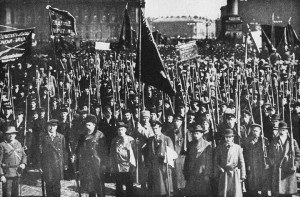
What was urgently necessary then was to deepen and broaden support for this spectacular struggle. Rallies should have been
organised to defend the protesters arrested for the action. Calls should have been made for more union struggles in defence of Aboriginal rights and against the anti-union laws. And workers’ leaders should have been bringing to fellow workers a systematic understanding of how parliaments under capitalism are always anti-working class. But instead, the pro-ALP ACTU leaders demoralised worker activists by condemning the storming of parliament and refusing to defend (or in some cases even dobbing in) those arrested for participating in the struggle.
Today, after a further ten years of the current, pro-ALP workers’ leaders doing their best to discourage unionists from struggles that escape the straightjacket imposed by the bosses’ institutions, workers have been hit not with Howard’s “first wave” but with his “third wave” of anti-union measures.
The biggest diversion to the road of liberation for the masses is, alongside nationalism, the fact that our own workers’ leaders keep on getting us to hope that some day, some nice, pro-worker people operating within the agencies of the capitalist state will bring us salvation. The 20th century was the century of great anti-capitalist revolutions – including in both the geographically largest country in the world and in the globe’s most populous country. But it was also the century of missed opportunities. The working class had many other chances of taking power but did not do so because it did not crystallise a leadership with a clear understanding of the need to sweep away the existing state. These failures include Spain in the 1930s, Iraq in 1958, Bolivia, Italy in 1969, and Portugal in 1975. In May 1968 in France, during the height of the Vietnam War, a student struggle turned into a massive unlimited general strike of 10 million French workers. Most of the working class had allegiance to the French Communist Party (PCF.) A million workers took over the factories. But instead of leading the workers towards power (which is what was truly posed then), the PCF treacherously demobilised the struggle in return for concessions for the workers. The French capitalist state was saved when its overthrow could have been initiated. And now, over the last few decades, the exploiting class there has been rolling back the concessions it made in 1968, while viciously attacking North African and black African youth and sending its military on colonial expeditions from Africa to the Balkans to Afghanistan.
So you amongst us who, through individual circumstance, have acquired the understanding that it is impossible to modify the capitalist state to serve the masses: it is your duty to bring that understanding to broader layers of the working class and oppressed! And make yourselves more effective in this work by studying the lessons of past class battles, both victorious and defeated, and by gaining experience in active intervention in the struggles of today. Help make the 21st century the century of the complete triumph of socialism!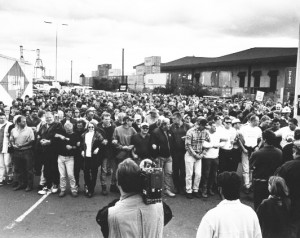
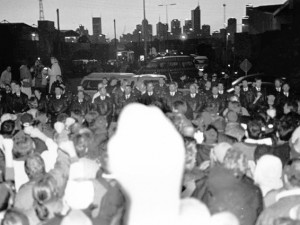
Appendix: Theses on the Communist Parties and Parliamentarism
Adopted by the Second Congress of the Communist International on 2 August, 1920
1. The New Epoch and the New Parliamentarism
The attitude of the socialist parties towards parliamentarism was in the beginning, in the period of the First International, that of using bourgeois parliaments for the purpose of agitation. Participation in parliament was considered from the point of view of the development of class consciousness, i.e. of awakening the class hostility of the proletariat to the ruling class. This relationship was transformed, not through the influence of theory, but through the influence of political development. Through the uninterrupted increase of the productive forces and the extension of the area of capitalist exploitation, capitalism, and with it the parliamentary state, gained continually increasing stability.
Hence there arose: The adaptation of the parliamentary tactics of the socialist parties to the ‘organic’ legislative work of the bourgeois parliament and the ever greater importance of the struggle for reforms in the framework of capitalism, the domination of the so-called minimum programme of social democracy, the transformation of the maximum programme into a debating formula for an exceedingly distant ‘final goal’. On this basis then developed the phenomena of parliamentary careerism, of corruption and of the open or concealed betrayal of the most elementary interests of the working class.
The attitude of the Communist International towards parliamentarism is determined, not by a new doctrine, but by the change in the role of parliament itself. In the previous epoch parliament performed to a certain degree a historically progressive task as a tool of developing capitalism. Under the present conditions of unbridled imperialism, however, parliament has been transformed into a tool for lies, deception, violence and enervating chatter. In the face of imperialist devastation, plundering, rape, banditry and destruction, parliamentary reforms, robbed of any system, permanence and method, lose any practical significance for the toiling masses.
Like the whole of bourgeois society, parliamentarism too is losing its stability. The sudden transition from the organic epoch to the critical creates the basis for a new tactic of the proletariat in the field of parliamentarism. Thus the Russian Labour Party (the Bolsheviks) had already worked out the nature of revolutionary parliamentarism in the previous period because since 1905 Russia had been shaken from its political and social equilibrium and had entered the period of storms and shocks.
To the extent that some socialists, who tend towards communism, point out that the moment for the revolution has not yet come in their countries, and refuse to split from parliamentary opportunists, they proceed, in the essence of the matter, from the conscious assessment of the coming epoch as an epoch of the relative stability of imperialist society, and assume that on this basis a coalition with the Turatis and the Longuets can bring practical results in the struggle for reforms. Theoretically clear communism, on the other hand, will correctly estimate the character of the present epoch: highest stage of capitalism; imperialist self-negation and self-destruction; uninterrupted growth of civil war, etc. The forms of political relations and groupings can be different in different countries. The essence however remains everywhere one and the same; what is at stake for us is the immediate political and technical preparations for the insurrection of the proletariat, the destruction of bourgeois power and the establishment of the new proletarian power.
At present, parliament, for communists, can in no way become the arena for the struggle for reforms, for the amelioration of the position of the working class, as was the case at certain times in the previous period. The centre of gravity of political life has at present been removed finally and completely beyond the bounds of parliament.
On the other hand the bourgeoisie is forced, not only by reason of its relations to the toiling masses, but also by reason of the complex mutual relations within the bourgeois class, to carry out part of its measures one way or another in parliament, where the various cliques haggle for power, reveal their strong sides, betray their weak sides, expose themselves, etc.
Therefore it is the historical task of the working class to wrest this apparatus from the hands of the ruling class, to smash it, to destroy it, and replace it with new proletarian organs of power. At the same time, however, the revolutionary general staff of the class has a strong interest in having its scouts in the parliamentary institutions of the bourgeoisie in order to make this task of destruction easier. Thus is demonstrated quite clearly the basic difference between the tactic of the communist, who enters parliament with revolutionary aims, and the tactics of the socialist parliamentarian. The latter proceeds from the assumption of the relative stability and the indeterminate duration of the existing rule. He makes it his task to achieve reform by every means, and he is interested in seeing to it that every achievement is suitably assessed by the masses as a merit of parliamentary socialism. (Turati, Longuet and Co.).
In the place of the old adaptation to parliamentarism the new parliamentarism emerges as a tool for the annihilation of parliamentarism in general. The disgusting traditions of the old parliamentary tactics have, however, repelled a few revolutionary elements into the camp of the opponents of parliamentarism on principle (IWW) and of the revolutionary syndicalists (KAPD). The Second Congress therefore adopts the following Theses.
2. Communism, the Struggle for the Dictatorship of the Proletariat, and the Utilisation of Bourgeois Parliaments
I
- Parliamentarism as a state system has become a ‘democratic’ form of the rule of the bourgeoisie, which at a certain stage of development requires the fiction of popular representation which outwardly appears to be an organisation of a ‘popular will’ that stands outside the classes, but in essence is a machine for oppression and subjugation in the hands of ruling capital.
- Parliament is a definite form of state order; therefore it cannot at all be the form of communist society, which knows neither classes nor class struggle nor any state power.
- Nor can parliamentarism be a form of proletarian state administration in the period of transition from the dictatorship of the bourgeoisie to the dictatorship of the proletariat. In the moment of sharpened class struggle, in the civil war, the proletariat must inevitably build up its state organisation as a fighting organisation, into which the representatives of the previous ruling classes are not permitted. In this stage any fiction of the ‘popular will’ is directly harmful to the working class. The proletariat does not need any parliamentary sharing of power, it is harmful to it. The form of the proletarian dictatorship is the soviet republic.
- The bourgeois parliaments, one of the most important apparatuses of the bourgeois state machine, cannot as such in the long run be taken over, just as the proletariat cannot at all take over the bourgeois state. The task of the proletariat consists in breaking up the bourgeois state machine, destroying it, and with it the parliamentary institutions, be they republican or a constitutional monarchy.
- It is no different with the local government institutions of the bourgeoisie, which it is theoretically incorrect to counterpose to the state organs. In reality they are similar apparatuses of the state machine of the bourgeoisie, which must be destroyed by the revolutionary proletariat and replaced by local soviets of workers’ deputies.
- Consequently communism denies parliamentarism as a form of the society of the future. It denies it as a form of the class dictatorship of the proletariat. It denies the possibility of taking over parliament in the long run; it sets itself the aim of destroying parliamentarism. Therefore there can only be a question of utilising the bourgeois state institutions for the purpose of their destruction. The question can be posed in this, and only in this, way.II
- Every class struggle is a political struggle, for in the final analysis it is a struggle for power. Any strike at all that spreads over the whole country becomes a threat to the bourgeois state and thus takes on a political character. Every attempt to overthrow the bourgeoisie and to destroy its state means carrying out a political fight. Creating a proletarian state apparatus for administration and for the oppression of the resisting bourgeoisie, of whatever type that apparatus will be, means conquering political power.
- Consequently the question of political power is not at all identical with the question of the attitude towards parliamentarism. The former is a general question of the proletarian class struggle, which is characterised by the intensification of small and partial struggles to the general struggle for the overthrow of the capitalist order as a whole.
- The most important method of struggle of the proletariat against the bourgeoisie, i.e. against its state power, is above all mass action. Mass actions are organised and led by the revolutionary mass organisations (trades unions, parties, soviets) of the proletariat under the general leadership of a unified, disciplined, centralised Communist Party. Civil war is war. In this war the proletariat must have its bold officer corps and its strong general staff, who direct all operations in all theatres of the struggle.
- The mass struggle is a whole system of developing actions sharpening in their form and logically leading to the insurrection against the capitalist state. In this mass struggle, which develops into civil war, the leading party of the proletariat must as a rule consolidate all its legal positions by making them into auxiliary bases of its revolutionary activity and subordinating these positions to the plan of the main campaign, the campaign of the mass struggle.
- The rostrum of the bourgeois parliament is such an auxiliary base. The argument that parliament is a bourgeois state institution cannot at all be used against participation in the parliamentary struggle. The Communist Party does not enter these institutions in order to carry out organic work there, but in order to help the masses from inside parliament to break up the state machine and parliament itself through action (for example the activity of Liebknecht in Germany, of the Bolsheviks in the Tsarist Duma, in the ‘Democratic Conference’, in Kerensky’s ‘Pre-Parliament’, in the ‘Constituent Assembly’ and in the town Dumas, and finally the activity of the Bulgarian Communists).
- This activity in parliament, which consists mainly in revolutionary agitation from the parliamentary rostrum, in unmasking opponents, in the ideological unification of the masses who still, particularly in backward areas, are captivated by democratic ideas, look towards the parliamentary rostrum, etc., should be totally and completely subordinated to the aims and tasks of the mass struggle outside parliament.
- Participation in election campaigns and revolutionary propaganda from the parliamentary rostrum is of particular importance for winning over those layers of the workers who previously, like, say, the rural toiling masses, stood far away from political life.
- Should the communists have the majority in local government institutions, they should a) carry out revolutionary opposition to the bourgeois central power; b) do everything to be of service to the poorer population (economic measures, introduction or attempted introduction of an armed workers’ militia, etc.); c) at every opportunity show the limitations placed on really big changes by the bourgeois state power; d) on this basis develop the sharpest revolutionary propaganda without fearing the conflict with the power of the state; e) under certain circumstances replace the local administration by local workers’ councils. The whole activity of the Communists in the local administration must therefore be part of the general work of disrupting the capitalist system.
- Election campaigns should not be carried out in the spirit of the hunt for the maximum number of parliamentary seats, but in the spirit of the revolutionary mobilisation of the masses for the slogans of the proletarian revolution. Election campaigns should be carried out by the whole mass of the Party members and not only by an elite of the Party. It is necessary to utilise all mass actions (strikes, demonstrations, ferment among the soldiers and sailors, etc.) that are taking place at the time, and to come into close touch with them. It is necessary to draw all the proletarian mass organisations into active work.
- In observing all these conditions, as well as those in a special instruction, parliamentary activity is the direct opposite of that petty politicking done by the social democratic parties of every country, who go into parliament in order to support this ‘democratic’ institution or at best to ‘take it over’. The Communist Party can only be exclusively in favour of the revolutionary utilisation of parliament in the spirit of Karl Liebknecht and of the Bolsheviks.III
- Anti-parliamentarism’ on principle, in the sense of absolute and categorical rejection of participation in elections and revolutionary parliamentary activity, is therefore a naive, childish doctrine below any criticism, a doctrine which occasionally has a basis in healthy nausea at politicking parliamentarians, but which does not see at the same time the possibility of a revolutionary parliamentarism. Moreover, this doctrine is often linked with a completely incorrect conception of the role of the party, which sees in the Communist Party not the centralised shock troops of the workers, but a decentralised system of loosely allied groups.
- On the other hand an absolute recognition of the necessity of actual elections and of actual participation in parliamentary sessions under all circumstances by no means flows from the recognition in principle of parliamentary activity. That is dependent upon a whole series of specific conditions. Withdrawal from parliament can be necessary given a specific combination of these conditions. This is what the Bolsheviks did when they withdrew from the Pre-parliament in order to break it up, to rob it of any strength and boldly to counterpose to it the St. Petersburg Soviet on the eve of the insurrection. They did the same in the Constituent Assembly on the day of its dissolution, raising the Third Congress of Soviets to the high point of political events. According to circumstances, a boycott of the elections and the immediate violent removal of not only the whole bourgeois state apparatus but also the bourgeois parliamentary clique, or on the other hand participation in the elections while parliament itself is boycotted, etc., can be necessary.
- In this way the Communist Party, which recognises the necessity of participating in the elections not only to the central parliament, but also to the organs of local self-government and work in these institutions as a general role, must resolve this problem concretely, starting from the specific peculiarities of any given moment. A boycott of elections or of parliament and withdrawal from the latter is mainly permissible when the preconditions for the immediate transition to the armed struggle and the seizure of power are already present.
- In the process, one should always bear in mind the relative unimportance of this question. Since the centre of gravity lies in the struggle for state power carried out outside parliament, it goes without saying that the question of the proletarian dictatorship and the mass struggle for it cannot be placed on the same level as the particular question of the utilisation of parliament.
- The Communist International therefore emphasises decisively that it holds every split or attempted split within the Communist Parties in this direction and only for this reason to be a serious error. The Congress calls on all elements who base themselves on the recognition of the mass struggle for the proletarian dictatorship under the leadership of the centralised party of the revolutionary proletariat exerting its influence on all the mass organisations of the workers, to strive for the complete unity of the communist elements despite possible differences of opinion over the question of the utilisation of bourgeois parliaments.
3. Revolutionary Parliamentarism
In order to secure the actual carrying out of revolutionary parliamentary tactics it is necessary that:
- The Communist Party as a whole and its Central Committee, already in the preparatory stage, that is to say before the parliamentary election, must take care of the high quality of the personal composition of the parliamentary faction. The Central Committee of the Communist Party must be responsible for the whole work of the parliamentary faction. The Central Committee of the Communist Party must have the undeniable right to raise objections to any candidate whatever of any organisation whatever, if there is no guarantee that if he gets into parliament, he will pursue really communist policies.The Communist Party must break the old social democratic habit of putting up exclusively so-called ‘experienced’ parliamentarians, predominantly lawyers and similar people, as members of parliament. As a rule it is necessary to put up workers as candidates, without baulking at the fact that these are mainly simple party members without any great parliamentary experience. The Communist Party must ruthlessly stigmatise those careerist elements that come around the Communist Parties in order to get into parliament. The Central Committees of the Communist Parties must only ratify the candidatures of those comrades who have shown their unconditional devotion to the working class by long years of work.
- When the elections are over, the organisation of the parliamentary faction must be completely in the hands of the Central Committee of the Communist Parties, irrespective of whether the whole Party is legal or illegal at the time in question. The chairman and the committee of the communist parliamentary faction must be ratified by the Central Committee of the Party. The Central Committee of the Party must have a permanent representative in the parliamentary faction with a right of veto, and on all important political questions the parliamentary faction shall ask the Central Committee of the Party in advance for instructions concerning its behaviour. Before any big forthcoming action by the communists in parliament the – Central Committee has the right and the duty to appoint or to reject the speaker for the faction, and to demand of him that he previously submit the main points of his speech or the speech itself for approval by the Central Committee. A written undertaking must be officially obtained from every candidate on the proposed communist list that, as soon as he is called upon to do so by the Party, he is prepared to resign his seat, so that in a given situation the action of withdrawing from parliament can be carried out in a united way.
- In those countries where reformist, semi-reformist or merely careerist elements have managed to penetrate into the communist parliamentary faction (as has already happened in some countries) the Central Committees of the Communist Parties have the obligation of carrying out a thorough purge of the personal composition of the faction proceeding on the principle that it is much more useful for the cause of the working class to have a small, but truly communist faction, than a large faction without consistent communist policies.
- On the decision of the Central Committee, the communist member of parliament has the obligation to combine legal with illegal work. In those countries where the communist members of parliament enjoy immunity from bourgeois law, this immunity must be utilised to support the Party in its illegal work of organisation and propaganda.
- Communist members of parliament must subordinate all parliamentary action to the activity of their Party outside parliament. The regular introduction of demonstrative draft laws, which are not intended to be accepted by the bourgeois majority, but for the purposes of propaganda, agitation and organisation, must take place on the instructions of the Party and its Central Committee.
- In the event of demonstrations by workers in the streets and other revolutionary actions, the communist members of parliament have the duty to place themselves in the most conspicuous leading place at the head of the masses of workers.
- Communist members of parliament must use every means at their disposal (under the supervision of the Party) to create written and any other kind of links with the revolutionary workers, peasants and other toilers. Under no circumstances can they act like social democratic members of parliament, who pursue business connections with their voters. They must be constantly at the disposal of the Party for any propaganda work in the country.
- Every communist member of parliament must bear in mind that he is not a legislator seeking an understanding with other legislators, but a Party agitator who has been sent into the enemy camp in order to carry out Party decisions there. The communist member of parliament is responsible, not to the scattered mass of voters, but to his Party, be it legal or illegal.
- Communist members of parliament must speak a language that can be understood by every simple worker, every peasant, every washerwoman and every shepherd, so that the Party is able to publish the speeches as leaflets and distribute them to the most distant corners of the country.
- Simple communist workers must appear in the bourgeois parliament without leaving precedence to so-called experienced parliamentarians – even in cases where the workers are only newcomers to the parliamentary arena. If need be the members of parliament from the ranks of the working class can read their speeches from notes, so that the speeches can be printed in the press and as leaflets.
- Communist members of parliament must use the parliamentary rostrum for the unmasking not only of the bourgeoisie and its hacks, but also of the social-patriots, and the reformists, of the vacillations of the politicians of the ‘centre’ and of other opponents of communism, and for broad propaganda for the ideas of the Communist International.
- Even in cases where there are only a few of them in the whole parliament, communist members of parliament have to show a challenging attitude towards capitalism in their whole behaviour. They must never forget that only he is worthy of the name of a communist who is an arch enemy of bourgeois society and its social democratic hacks not only in words but also in deeds.
Sourced from www.marxists.org
First Published: Publishing House of the Communist International, 1921.
Source: Second Congress of the Communist International. Minutes of the Proceedings. Volume One and Two.
Published: by New Park Publications, 1977.
Notes
- “The state, then has not existed from all eternity. There have been societies that did without it, that had no conception of the state and state power. At a certain stage of economic development, which was necessarily bound up with the cleavage of society into classes, the state became a necessity owing to this cleavage. We are now rapidly approaching a stage in the development of production at which the existence of these classes not only will have ceased to be a necessity, but will become a positive hindrance to production. They will fall as inevitably as they arose at an earlier stage. Along with them the state will inevitably fall. The society that will organize production on the basis of a free and equal association of the producers will put the whole machinery of state where it will then belong: into the Museum of Antiquities, by the side of the spinning wheel and the bronze axe.” (From The Origin of the Family, Private Property and the State, F. Engels, 1884.)
- “In the battles with the enemy, the workers of Moscow displayed matchless fortitude, revolutionary discipline and selfless devotion to the cause of the working people. Pyotr Dobrynin, a 23-year-old worker at the telegraph and telephone factory, continued to command his men even after being wounded in the shoulder; soon afterwards he was killed in the fighting. Lusya Lisinova of the Zamoskvoretsky District Party Committee died a heroine’s death in the Ostozhenka fighting on November 1. Pavel Andreyev, 14-year-old son of a foundryman at the Michelson Works, was mortally wounded in the fighting against the cadets and taken to a hospital. “We’ve won, haven’t we?” the boy asked as he regained consciousness for a moment. He was told that the workers had won. “I knew it,” Pavel replied. These were his last words.” (From History of the October Revolution, Sobolev, P.N. [Editor-in-Chief], 1966.)
